Some days it appears bleak. Freedom seems to be fading even in the most democratic states. In late 2011, draconian clauses encased in the National Defense Act were passed through Congress and signed by President Obama, and in early 2012, the Stop Online Piracy Act was seriously considered by the U.S. Senate before public outcry killed it. The two bills served to underline fears of conspiracy theorists across the country: the government does want to detain you without due process and restrict freedom of speech. The internet was, of course, in an uproar. Neocons hated the NDA specifically because Obama signed it. Left wingers hated it for ideological reasons. Conspiracy theorists like Alex Jones raged that it was truly the end of America. Wikipedia, reddit, Boing Boing, and a host of other sites shut down for a day to revolt against SOPA and PIPA, and events like this are spreading across the globe in the EU, Russia, and the Middle East. There has been a consistent conflict between the liberal and realist philosophies of international social science over the last 100 years. This debate not only has been waged in the Modern world, however, but also far back into the Paleolithic, Neolithic, and early civilization. Inside this paper, I will briefly describe these eras, but what I really want to delve deeply into is this: there is not only a physical war being waged, but one inside all of our heads. It is the battle between the left and right hemispheres of our brain. On one side is the right, our feminine nature which is inclusive, wild, and nurturing, and on the other is the left, the part of us that wants to box, to fight wars, and separate the cosmos into pieces. This side has been dominant for centuries but it is no longer possible to deny the other hemisphere. The U.S., contingent on this hypothesis, must continue to utilize international organizations as globalization and information technologies will continue to link us together in profound ways, and these ways are of our feminine, inclusive, nature.
Feminist theorists state that realist international theory, based on go-it-alone individualism, is the way of the masculine brain's hierarchical nature. Nations, according to this theory, are constantly vying to maintain their relative position. It is a dog eat dog world out there, and a country will only succeed if it is able to overpower others in some way. This is opposed to the utopian liberal theory—one in which diplomacy and interdependence are the key. International relations interpreted through a female mind, many feminists make the claim, would be far more inclusive. Countries would be more empathetic, less likely to make unilateral decisions, and consider the good of the entire Earth. This idea is rooted in the ancient Goddess—she whose body we are made of. During the Paleolithic, Karen Armstrong opines, women and men held equal power. On one end, the men went forth into the wild (always the doer based on mythological symbols) to hunt and bring back the meat. These feats were far more dangerous and required a burst of energy and a great deal of guilt when the animal was killed. On the other end were the gatherers, the more traditional female role. Women would descend on the area around their particular base and find food to eat. This was less dangerous but allowed for a more stable food supply if the hunting did not go well. On top of this, the women gave birth, raised the children, and brought them to adulthood. In this scenario, both the female and male held equal power. Without either, a clan risked stagnation and death. The birthing process was also seen as supremely mysterious during this time. Men did not know that sexual intercourse caused conception. The symbol of the snake has been linked to the female. It can shed its skin, crawl along the earth on its stomach, and an umbilical cord looks very much like their serpentine structure. These symbols and dualities are depicted in Genesis.
However, with the advent of agriculture, women began to take control. Farming was a natural female occupation—it required nurturing over a long period of time, unlike the masculine energy which was based on pin-pointing a problem and fixing it. Many theorists, including Leonard Shlain and Karen Armstrong, assert that the male mind has evolved for precision and sudden bursts of energy, while the feminine one is geared toward a more conservative, nurturing nature that is the foundation which men can do their doings. Sean Kane opines in Wisdom of the Mythtellers that in Celtic mythology the world of men is where wars are waged, tools constructed, and where things are actually done. The Otherworld, on the other hand, is magical, powerful, and mysterious, influenced by the seasons and cycles. However, it is also ineffectual. During the Neolithic, gods and goddesses like Osiris and Isis, Baal and Astarte, and Adonis and Venus became popular. It was in these myths that the woman was supreme and the male her dying escort who passed with the seasons each year. What happened? Why did men gain control across the globe? Some theorists state that agriculture led to ownership, which led to laws, which led to states and armies to defend what was owned. This was a nascent masculine realist attitude, and it would dominate for centuries to come. In the Modern era and after World War II, the West had grown tired of the old ways of doing things. It could no longer pretend that states would do no harm to each other on the basis of their word alone. This was a reemergence of a feminine outlook—a new (old) way of doing things. Under their leadership, it would be a century of increasing interdependence which would drive everyone closer together, not just the political and financial elite. However, there have been growing pains. As I described at the onset of this paper, governments around the world are looking to curtail freedoms. The feminine inclusiveness is a terrifying prospect for those in control. However, the answer does not lay in feminist theory.
Feminists are derided by most of the world, and this is often deserved. What the bra-burners preach is equality not based on differences but on how we are all the same. Sometimes they will even go on to say that women are the superior sex. It is true that as we continue to move into the 21st century, women will gain more power. Birth rates will continue to go down and women will continue to spend less time raising kids. They will also delay marriage as it increasingly becomes no longer economically necessary to do so. Clearly, women stand to gain more power in this new political and economic world. World Politics Trend and Transformation by Kegley and Blanton reports that "the repeated outbreak of war has led some, such as psychiatrist Sigmund Freud, to conclude that aggression is an instinctive part of human nature that stems from humans' genetic psychological programming" (253). A global outlook is, in the end, a result of the feminine right brain, and individualism that of the masculine left. Again, we see the war playing out both in the material and mental arenas. World Politics continues, "Most social scientists now strongly disagree with the realist premise that because humans are essentially selfish, they are also aggressive and murder and kill because of their innate genetic drives to act aggressively. Instead they interpret war as a learned cultural habit" or socialization (254). Feminist theory argues that war and conflict are "rooted in the masculine ethos of realism". It is true that one of the most tell-tale signs of an unstable country are its treatment of women—"where cultural norms condone the mistreatment of women and deny them opportunities for education and employment, the outbreak of civil war is high" (258).
International organizations like NGOs and IGOs are from the right hemisphere of the brain. They serve to link the world together and create ties to each other. According to constructivists, attitudes about what is right and wrong will shift in the coming years. I believe that shift will be towards the right brain. In this case, it will be increasingly necessary for the United States, which is being transformed by technologies like the internet, to rely on these organizations. It is no longer possible to go it alone. The U.S. learned this the hard way during the second Gulf War. It is also far more dependent on foreign debt to finance itself than it was just a few decades ago, with China owning seven percent of the total, and interconnected via trade blocs, treaties, and special relationships. This is not the point to shrink back and isolate ourselves. That would be the losing end of history.
New information technologies have transformed our lives. Multinational corporations continue to prosper as states fall by the wayside. The notion of 'state' itself may find itself changing as the constructivists have predicted. The world, indeed, is becoming smaller. The community is the realm of the female mind, and this will be a feminine century. Not only will women gain more power, but so will institutions which support their way of handling things. The mythological wood is the place in mythology where boundaries are broken. In Shakespeare's plays, such as A Midsummer's Night Dream and As You Like It, it the place where lovers go, where sex becomes confused, where women rule and magic still resides. In the city men are kings—Octavian, Theseus, and the Dukes—represented by geometry, stone, and hierarchy. The world is being transformed into a global wood with the ascension of information technologies. Some make the claim that it was the alphabet that led to the domination of the masculine left brain. If that is the case, then the internet, with its icons, images, and memes, is a return to the right hemisphere. This bonding together of community, as we have seen in the Arab Spring, in Russia's protests against Putin, and Occupy Wall Street, is a tide which cannot be stopped. How can governments counter this? They can increase their investment in international organizations. Make them really matter. Meld the world into a global community like there never was before. I call for a feminine individualism—one that seeks to balance both sides of the brain like Apollo's lyre—and for IGOs and NGOs that support this goal. It would be the home of compassion and truth, not senseless bickering and tit-for-tat diplomacy. I think everyone can agree that is something we want.
Friday, March 30, 2012
Wednesday, March 28, 2012
Poe Brick by Brick by Brick by Brick by Brick by Brick by Brick
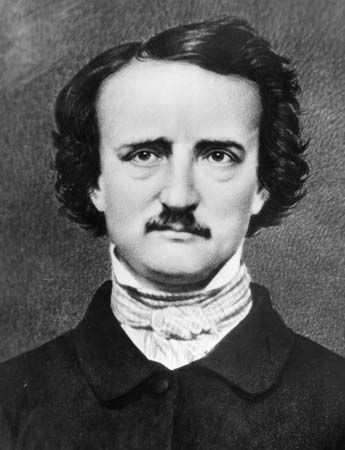
Edgar Allan Poe was known for constructing his stories brick by metaphorical brick, placing each word in the perfect place. He was the creator of the modern mystery narrative, which Dr. Sexson compared to Classical dramas like Oedipus--the result of written word and the need for beginnings and endings. I could spit out a bunch of sentences about how the alphabet led to this. And damn I shall: the linearity and separateness of words, if it did not create hierarchy all together, provided a catalyst for it. Writing also has the potential to completely eliminate magic. Here is what I wrote a few years ago for my Lit Crit class about Poe:
Edgar Allen Poe believes that great pieces of literature and artwork are not acts of sublime divinations and magical hocus pocus and happy rainbow bunnies and merry pixies with pixie whips and pixie sticks and pixie haircuts; no, Poe contends that instead they are composed by engineers, putting the pieces together like a mechanic installing the engine, the windshield, and the lights into a wienermobile--it's an act of great concentration, thought, and sweaty foreheads. No more is there a master magician composing music under an apple tree, notes falling from his trombone like arrows from Cupid or words from God's lips; now there is only a man or woman intricately laying out his masterpiece (or master-crap) like stones in a path. Great art is no longer about the creator's communication with some higher power, but rather his ability to link the lego blocks together to form something coherent and entertaining. He is a mason setting corner stones, measuring distances, laying plaster, and lining up bricks. He is a monkey stacking bananas to form a giant banana castle where all his monkey friends can live and be friends and be happy forever in the banana palace. He is Superman using his laser piss to carve "I f***ing hate kryptonite" into Lex Luthor's forehead. He is God, forming the universe into perfect existence, one slice at a time--light, land, sea, animals, plants, human. He is the planeteers touching their rings to bring the man-god Captain Planet into existence.
Okay, enough metaphor--let's face it, Poe's grand idea about the creation of literature and art is a bunch of horse pooey. The man was a drunk, a loner, ugly and depressed and womanless and generally shameful and disrespectful. No way was he capable of constructing a story, let alone a life, or even an IKEA chair. His idea steals the enchantment from the one magical thing left in existence: story and art. If mythos is reduced to yet another engineering science project, then we are truly left with nothing. I recall summer camp from my youth. It was a time of mystery, of adventure, of real monsters, of terrifying noises in the woods, of pirate ships, of ghosts and ghoulies, of thunderbirds and dragons, and of gnomes. The camp fire would burn-- smoke, ash, roasted hot dogs and marshmallows, stories and flashlights, sleeping bags and terror, felicity and excitement, sleeping in bundles below the awning. The universe was a place inhabited by magical creatures just waiting to be discovered, and I was an adventurer, a jedi, a villain, and a swashbuckler. However, as I grew older they stole that from me--the universe was reduced to, "an inert entity, hurtling about neverendingly, an immense machine of matter and motion blindly obeying mathematical laws" (Ramaswamy - Lemuria 9). If Poe is right and allurement is dead, then there is no reason to continue to live. Meaning is robbed from me if even the power of mythos has gone the way of the Dodo.
Though my writing style may have changed since that time, my feelings about Poe haven't. I still find his writing style dry and unentertaining. Kevin Jackson, in an article titled "The great bad writer" published in Prospect, writes, "American literature came of age in the 19th century, and quite soon produced a remarkable crop of masters… and very much the odd man out [was] Poe. [...] [but none has had] such a far-reaching and protean influence as Poe—and not just the murky waters of mass culture, but also amid the loftier, more rarefied heights of elite culture. This dual triumph is all the more improbable when you reflect that, by most standards, Poe was not a very good writer. " It was in France where Poe found himself among the truly elite of literary icons. Writers like Charles Baudelaire were infatuated with Poe, putting him on a pedestal above all and literally worshiping him. How did this happen? It makes sense. As we moved into the scientific age we placed more emphasis on well-constructed narrative with a beginning, middle, and end, where each word has its specific place for a reason. However, what it robbed from us was the sense of magic. We are JUST automatons bumping into each other; we are all going to die and that will be it. Your life truly is meaningless you sad, sad, material monkey-man. For a Post-Colonial theory class I wrote this paragraph (sorry to keep quoting myself, I know it's a no-no):
Sumathi Ramaswamy discusses this further in The Lost Land of Lemuria and asserts that this mass longing for a "unity with the homogeneous past, a desire for the closure of difference" (7) stemmed from Britain's progression into modernity. In a constantly changing world, everything is left by the wayside and nothing is constant. Ramaswamy quotes Celeste Olalquiaga saying, "Modernity is a displaced time: it wants nothing to do with the past and looks only toward a future receding on the horizon. Yet the past ... continually reappears like a littered landscape next to an indifferent highway." Olalquiaga calls this "the intoxication of modernity". Nothing matters in this world composed of chemistry, geology, physics, astronomy--we are just stumbling around like a game of Yahtzee, irrelevant, random, no better than a monkey swinging around in a tree with a yucky banana next to its gross little mug.
Ramaswamy goes on to claim that the British in the 19th Century were making it "no longer possible to live in union with the divine" because "the universe, once perceived as alive and as cognizant of its own goals and purposes, [was] now an inert entity, hurtling about neverendingly, an immense machine of matter and motion blindly obeying mathematical laws". Britain had created a way of life lacking mystery, leaving a "great void in the souls of men" and rendering their lives "impoverished, [and] reduced to an endless pragmatic and instrumental pursuit of meaningless activities". They were suffering from a crisis of belief and wishing to escape from their modern prison--logos must be balanced by mythos, and they found much of their new mythos in a rapidly shrinking place: the colonies, places still holding mystery, intrigue, and freedom from a "pragmatic reality". But what happens when the periphery is used up? Again, we must ask ourselves if the imagined absolute world of the Orient is something we really want to hold onto? (All quotes from Ramaswamy are from page 9 of TLLoL if not stated otherwise.)
Nostalgia is a topic which fascinates me and since it has to do with memory, why not discuss it here? I remember revisiting a copse of trees near my house last summer. I used to play there when I was a kid. The thing was, it was exactly the same as I had left it. I had changed!
The sky was growing darker as more clouds moved in. I was thinking of leaving soon, but I wanted to see one more spot. It was there where my friend and I had battled our Transformers, throwing our toys off the cliff wall and into the grass below. Even as children, we were violent creatures, and I am not sure how much that has changed. We have just learned to cover it up better. My feet collected mud and tracked behind me as I moved over the sandstone rocks. It was strangely quiet. I remembered birds and occasional deer, and at the very least, bugs, but this place was absent of all that. I stood on the edge of the cliff, staring down where our plastic men had fallen. I didn't spot any down there. We were always meticulous in cleaning up afterwards.
The storm in the distance was rumbling, and the air seemed to cackle with astrality, like the clouds' static were affecting reality. I turned to leave as specks of rain gave the rocks chicken spots. My stomach was churning. Something wasn't right. I touched each trunk, resisting the urge to turn around. My fingers felt different, like they were blurring with the surrounding bark. The rain was no longer splatting against me, it was going through me. Blue haze formed around the ground and the trees, unzipping like a child's jacket. Something moved behind one of the branches. It bounced up and down in a rhythmic motion, up and down, and I was transfixed. Only a man could do that to a tree right? But I had to be alone. Who's there? I shouted, but no one answered. The branch kept doing the same movement though, and it was gradually getting more violent. A wing came from it--a small, slimey wing, dripping something like red ooze. It disappeared as quickly as it came. I wanted to scream, but I couldn't. A slurping like a straw, or a buzzing, was now coming from it. It overwhelmed me as the tip of the wing appeared again, sliding from some invisible portal, getting bigger and bigger. And then it emerged, as if out of another dimension or universe--a terror which couldn't have been born of our world. My legs started moving before the rest of me did.
My mind felt like it had turned off. This couldn't be happening--I refused to be believe it. My vision began to blur to grey. My hearing had been rendered useless; there was only a loud screeching noise like a fuzzy television in my ears. My sense of balance was off as I tried to scamper up the rocks, but My feet stumbled under me, and I tripped and hit my knee. No human mind could handle this--it was too out of the mundane world we function in on a daily basis. I couldn't tell whether it was following me or not, but somehow I knew it was slipping along behind me, its arachnid-like incisors opening wide, its squidy tentacles slithering along, and its three red wings crimson in the darkening day. The sky above boomed in thunder, rain clouds moving in quickly, swallowing up the blue sky. I couldn't even scream for help. My jaws seemed to be wired shut, incapable of movement.
In front of me, trees were bending over in the wind, blowing debris around. I stepped on a cactus, but my body felt no pain on my flee from the beast. To stop and free it was death. I suddenly tripped, falling between two rocks. I thrust out my hand and felt it crunch. There was no moving. Rain drops collided with my body, and I shivered like a little kid who thought a monster was under his bed. I sat there for a long time. The creature never came for me, but I swear it was real to this day. My mind sat in a pit of sorrow and terror, and there was no leaving. I thought I was going to die. I was prepared to die. The universe made sense, in its own sublime way. I was going to leave it, all my memories of sights, sounds, tastes, and touches. It was all over now and I was okay with it. But eventually the sun came up and I dried off. I walked towards home, feeling more alive than I had ever felt before. But later, new thoughts came, thoughts which were foreign to me.
I wish nobody died, and I wish nothing went away. I don't want to miss anything, and I don't want my family to die, and I don't want to leave school. I want to feel either everything or nothing, and I want to love somebody so much it hurts. Stare into her eyes until the universe falls away, and wax philosophy late into the night when the infomercials are on and Billy Mays lives. I want to watch childhood movies until I die, and I want to play make believe in that empty field across the street. Long, dried up grass stretched forever, and the grasshoppers chirped, and Every day was an adventure, and every day I was someone new: a jedi, a transformer, a pokemon trainer, a grasshopper hunter, a podracer pilot, Link searching for the triforce, getting married at the alter, staring at the sky and imagining God was giving me signs in the clouds, collecting ants in a tin can, and believing I would never grow up. I would whisper all this, that Fern Gully terrified me, that I would cry in daycare everyday when my mom was late in picking me up, that I always dreamed of leaving this planet behind like Levon's Jesus, that the world seemed too small for me, that I would never be the person I always wanted to be and my predictions came true, that I cried myself to sleep more than one night because I knew I was growing older and it would someday all end. She would smile and tell me everything is going to be okay. Then I would smile back and tell her she is lying. I would tell her about the romantic mountains, how they represent the earth's harshness. We're not supposed to live here, I would say, on such a hostile world. Then I would tell her they are the most beautiful damn things I have ever seen, that they made the earth a romantic place and I would never do away with them. I would tell her about accounting, economics, politics, pop culture, science fiction, movies, television, books, poems, history, Say Anything, Animal Collective, Sunset Rubdown, Star Wars, and all the stupid crap that I think about that nobody else thinks about because it is stupid. And she would listen to it all and judge me like at the end of days. God, Moses, and Jesus will sit on their golden thrones, rubies sparkling in the ceiling, and they will shake their heads and call me unfit for their kingdom and be deemed inadequate. The gates will shut. But she won't do that, and I shall be set be free.
Sunday, March 25, 2012
Internet Memes & Secondary Orality
The beauty of this technological century is that it gives power back to the introverts. Clive Thompson, in the April edition of Wired magazine, wrote an article titled "Solo Performance" which discusses people like Guy Kawasaki, a popular entrepreneurial blogger, who admitted a few years ago, "You may find this hard to believe, but I am an introvert. I have a 'role' to play, but fundamentally I am a loner". This is a startling fact! Where the oral tradition forced a person into constant physical interaction because it was nearly impossible for him to do so by any other means, the internet can allow a person to descend so far inward, alone on his desk or lap top, that he can return to the fundamentals of illiterate culture. It has been concluded by researchers like Susan Cain, and discussed in this fascinating New Yorker article by Jonah Lehrer, "Groupthink: The brainstorming myth", that traditional group meetings are ineffective compared to other methods--"That's because," reports Thompson in Wired, "social dynamics lead groups astray; they coalesce around the loudest extrovert's most confidently asserted idea, no matter how daft it might be." Thompson reasons that "virtual collaboration" is not only the way of the future but will also lead to better decisionmaking. It forces each member to consider his ideas alone before he speaks.
Our culture places a high amount of value on gregarious go-getters who are comfortable chatting with anybody; however, it is also the case that 50 percent of the population is not like this and never will be.
Thompson ends his article with the following statement, "We generally assume that [the internet] has unleashed an unruly explosion of disclosure, a constant high school of blather. But what is has really done is made our culture more introverted--and productively so." Indeed, research has shown that better ideas are brought forth from private thought before the actual meeting takes place. This is quite similar to how the web functions (with the caveat of web sites like Facebook and Twitter, based on friend collecting). Things like email, instant messaging, comment posts, and even text messages are typically measured before sent. The internet has also led to the creation of "look-before-they-flame-out" memes. With one quick glance around sites like reddit or Digg, you will discover a plethora of modern day icons. They represent aspects of our modern personalities, just like the ancients had their gods.
There is the socially awkward penguin:



The foul bachelor frog:

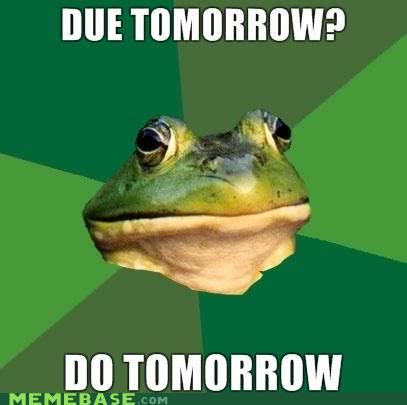
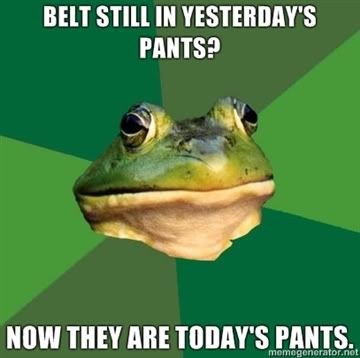
The courage wolf:

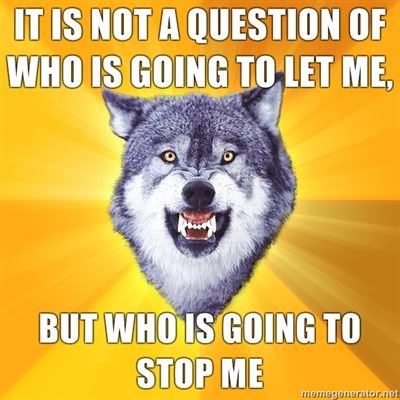
The paranoid parrot:


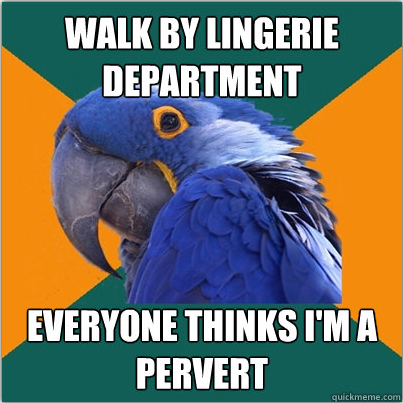
forever alone:
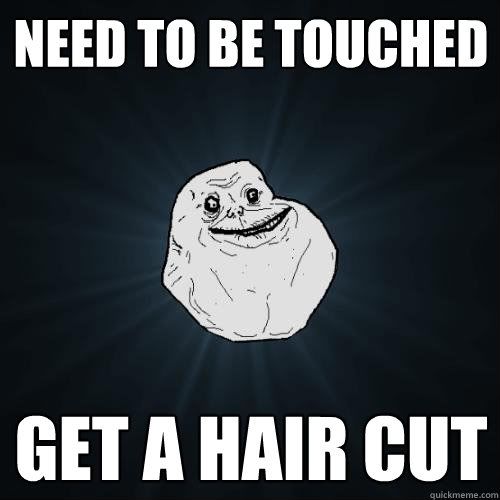

There is an endless list of memes, from Scumbag Steve and Good Guy Greg, to College Freshmen and College Senior, to First World Problems and Bear Grylls (of course obsessed with drinking his own piss), with inevitable new ones popping up each week on sites like r/AdviceAnimals and Quickmeme. Like characters from television or comic books, they are interpreted by an endless array of people adding their particular spin on the character. Some, of course, relate more with SAP, others with FBF, and others with PP. Often we have a bit of all the characters inside us. Like the public forums of old which brought together whole communities, these memes typically originate with the self proclaimed "butt-hole" of the internet, 4chan. It is forum filled with hilarious images, terrible pornography and gore (especially /b). After their creation on 4chan, the best memes end up at the social news site, reddit, where they are brought to a more acceptable and standardized image. One could relate this process to the oral tradition's acceptance of the vulgar, of the disgusting, of sex, gore, and wretched inhumanity, and then these being brought to a literate culture where morals and standardization become more important. Oral culture accepts everything, literate culture does not.
These memes are also fascinating in how they return to a sort of image or icon, a medium associated with the feminine in Leonard Shlain's The Alphabet Versus the Goddess. What does this mean? Well, for one, anyone can influence a cultural image like FBF or SAP, but written words are brought together by an author (associated with 'authoritative'). Words in a book are static and it is hard to challenge the original writer, as Walter Ong explains so well in Orality and Literacy. Thus, memes can be far more influenced by the cultural attitude at the time because they are brought to us not by one person but by many, and they are commented on continuously.
The masculine author influences events, the feminine zeitgeist is a result of the author's (the individual's) work. It is the difference between the doer and the foundation the doer builds upon and ultimately changes in some way.
The meme is the result of millions of minds coming together in solitude. They are the introverted gods of our age, and that is obvious when you see them (SAP, PP, and FBF being some of the most popular). Whole subreddits are also dedicated to user-made comics titled 'rage comics'. They typically show some event which angered its creator. Unfortunately I cannot cite the original posters of the comics below, but here are some examples:

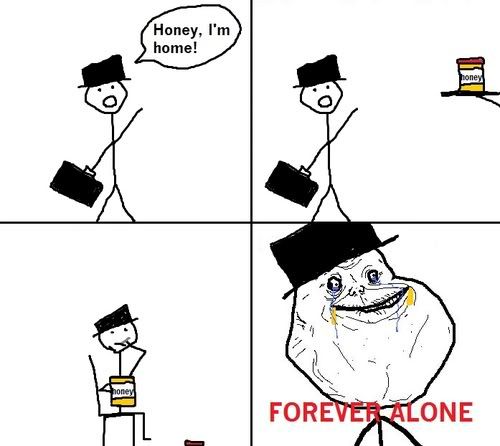
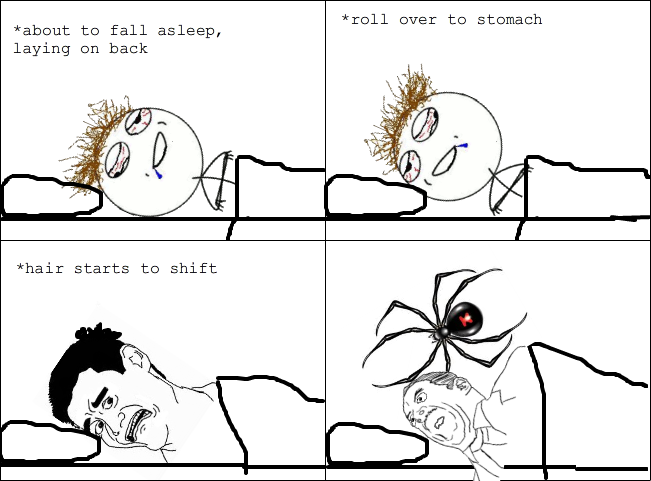
Was there ever an equivalent of this before the information age? Reddit is filled with thousands of these "subreddits" which bring together users who are interested in the same topic, and I am personally a member of r/literature, r/promtoftheday, r/mythology, and r/criticism. Anyone can post an article, video, or comment on one of these boards, and if they are popular enough, can be read by thousands of people all over the world. It has also become quite popular with celebrities, who will create a forum on r/iama and have a chat with their fans. Interactions like this were impossible just 15 years ago.
Will the collective mindscape start to become even more transformed by memes? One only needs to look at the Kony video phenomenon to see how it could play out in the future, but it is still a clunky process, one which takes time and a great deal of good luck. As our lives become increasingly entwined with social networking, I believe we will see a shift towards the 'secondary orality' which Walter Ong talked about. This will be the marriage of the literate and oral tradition.
The info age has just begun and I am excited for its future.
Our culture places a high amount of value on gregarious go-getters who are comfortable chatting with anybody; however, it is also the case that 50 percent of the population is not like this and never will be.
Thompson ends his article with the following statement, "We generally assume that [the internet] has unleashed an unruly explosion of disclosure, a constant high school of blather. But what is has really done is made our culture more introverted--and productively so." Indeed, research has shown that better ideas are brought forth from private thought before the actual meeting takes place. This is quite similar to how the web functions (with the caveat of web sites like Facebook and Twitter, based on friend collecting). Things like email, instant messaging, comment posts, and even text messages are typically measured before sent. The internet has also led to the creation of "look-before-they-flame-out" memes. With one quick glance around sites like reddit or Digg, you will discover a plethora of modern day icons. They represent aspects of our modern personalities, just like the ancients had their gods.
There is the socially awkward penguin:



The foul bachelor frog:



The courage wolf:


The paranoid parrot:



forever alone:


There is an endless list of memes, from Scumbag Steve and Good Guy Greg, to College Freshmen and College Senior, to First World Problems and Bear Grylls (of course obsessed with drinking his own piss), with inevitable new ones popping up each week on sites like r/AdviceAnimals and Quickmeme. Like characters from television or comic books, they are interpreted by an endless array of people adding their particular spin on the character. Some, of course, relate more with SAP, others with FBF, and others with PP. Often we have a bit of all the characters inside us. Like the public forums of old which brought together whole communities, these memes typically originate with the self proclaimed "butt-hole" of the internet, 4chan. It is forum filled with hilarious images, terrible pornography and gore (especially /b). After their creation on 4chan, the best memes end up at the social news site, reddit, where they are brought to a more acceptable and standardized image. One could relate this process to the oral tradition's acceptance of the vulgar, of the disgusting, of sex, gore, and wretched inhumanity, and then these being brought to a literate culture where morals and standardization become more important. Oral culture accepts everything, literate culture does not.
These memes are also fascinating in how they return to a sort of image or icon, a medium associated with the feminine in Leonard Shlain's The Alphabet Versus the Goddess. What does this mean? Well, for one, anyone can influence a cultural image like FBF or SAP, but written words are brought together by an author (associated with 'authoritative'). Words in a book are static and it is hard to challenge the original writer, as Walter Ong explains so well in Orality and Literacy. Thus, memes can be far more influenced by the cultural attitude at the time because they are brought to us not by one person but by many, and they are commented on continuously.
The masculine author influences events, the feminine zeitgeist is a result of the author's (the individual's) work. It is the difference between the doer and the foundation the doer builds upon and ultimately changes in some way.
The meme is the result of millions of minds coming together in solitude. They are the introverted gods of our age, and that is obvious when you see them (SAP, PP, and FBF being some of the most popular). Whole subreddits are also dedicated to user-made comics titled 'rage comics'. They typically show some event which angered its creator. Unfortunately I cannot cite the original posters of the comics below, but here are some examples:



Was there ever an equivalent of this before the information age? Reddit is filled with thousands of these "subreddits" which bring together users who are interested in the same topic, and I am personally a member of r/literature, r/promtoftheday, r/mythology, and r/criticism. Anyone can post an article, video, or comment on one of these boards, and if they are popular enough, can be read by thousands of people all over the world. It has also become quite popular with celebrities, who will create a forum on r/iama and have a chat with their fans. Interactions like this were impossible just 15 years ago.
Will the collective mindscape start to become even more transformed by memes? One only needs to look at the Kony video phenomenon to see how it could play out in the future, but it is still a clunky process, one which takes time and a great deal of good luck. As our lives become increasingly entwined with social networking, I believe we will see a shift towards the 'secondary orality' which Walter Ong talked about. This will be the marriage of the literate and oral tradition.
The info age has just begun and I am excited for its future.
Friday, March 23, 2012
Cities and Wilderness
Airports are little puddles of misery. Before me sat a mother sending her young child away to visit her father in Seattle. She talked to her softly, kindly, like a woman does, but the little girl kept on asking questions: If her father was expecting her. If he would pick her up from the airport. About her dad's new girlfriend. The mother answered each methodically, not getting annoyed, just taking them as they came. Behind me another woman burst out crying. She hugged an older man and held on for a long time, it seemed. My mind started putting together these people's various stories--who they were, why they were traveling out of Montana, if they were good or bad people. Sometimes I worry that everyone is happy all the time but me--airports prove that that is not the case, at least during people's brief sojourn in the terminal. If you want drama, there is no better place to go. You see ruptured lives, departures, sad stories, happy ones too. On the plane itself (the first time I had been on one since I was very young) I met a nice school teacher from Bozeman. She told me how excited she was to see "Hunger Games", about her coming trip to Mexico, and how she loved to travel. I did not realize that my friend from high school, Alex Brinkman, would be accompanying me all the way to Portland, however. I think it would have eased my nerves if I had known a familiar person was on the aircraft with me.
Portland is a gorgeous city. The buildings are varying styles and ages and there are nice pedestrian areas around downtown. It rains a lot, and "The City of Bridges" has a massive (by my standards anyway) river running through it called the Willamette. Being from Montana, even the greenery fascinated me. This isn't evergreen, this is "Troll in Central Park" green. I could almost admire the grass sprouting along the roots of a tree as much as I could the skyline, and that's saying something--you forget how unique the place you live is the longer you stay there. As I stare out my window now I have a great view of the mountains. However, if I am not careful, i forget ... forget how wonderful Montana can be too. In Portland, I ate at Voodoo Donuts, a Chinese restaurant, Pho and Toast, and many other interesting and tasty eateries. I stayed mostly around Chinatown and the Pearl District; however, I also walked along the waterfront and the more business-orientated areas. Another tourist destination is Ground Kontrol--basically an arcade that is also a bar, filled to the brim with cool looking hipsters. On my third day in the Pacific Northwest, I visited Seattle, which is my favorite of the two cities. It's so amazing that it was built on hills, with steep roads and awesome views of Puget Sound. In a city, I prefer the secluded spots, the little nooks, more than the typical tourist hot pots. Cities fascinate me. The character built up on years of life, of blood, sweat, and tears. Little alleys and tucked in areas that only certain people can access. They are mazes. Great big mazes constructed over years and years and from different minds. The city is like a bazaar, or even a social computer structure like Linux--they are put together, made beautiful, because of the different architects who decided to place their mark on it.
Cities are where the doers do, and the country is where the passive stay passive. Nothing changes in Montana, but things change in the city all the time. They transform with each foot pushing into mud or a dime thrown in a bum's cup. In the southern district, people chuckle dismissively in a comedy club, a woman asks a man for a smoke outside a 30 story building, and a drunk pees on a red brick wall as a train passes by. Somewhere in the north, an ill college student writes his passions on the blank pages of his journal, on the floor under him two people make love, and under them is an older woman watching Starz. Nothing that interests her is on tonight so she decides to go to bed early. Down below, far below, in an alley with a thrown over garbage can, someone is getting mugged. A man of great wisdom or terrible pride can render a city raw with the bite of his words or the tip of his pen. Revolutions can happen in the country, but they are always a result of a person inspired by vitriolic ideas from the urban world. In Montana, the entanglement of branches, leaves, and bark with the high peaks in the West and the empty plains of the East have a sort of order to them as well, but what they lack is the energy and spirit of man's will. His desire to transform perceived chaos into order (blocks, ovals, window panes, side walks, cement). Both are necessary. Both realms of delight. But a city is where a man goes to construct his ego; the wilderness the place to dissolve it. It reminds him that nature is all-consuming, endless, and that man's world is a strict illusion. The city grows from the gifts of the earth and orders it to understand it, the earth is the foundation of man's world--they complete each other and are the masculine and feminine energies of the cosmos.
Returning home is always an interesting experience, especially for one who doesn't travel often. You see things differently, appreciate things more. It changes you.
Portland is a gorgeous city. The buildings are varying styles and ages and there are nice pedestrian areas around downtown. It rains a lot, and "The City of Bridges" has a massive (by my standards anyway) river running through it called the Willamette. Being from Montana, even the greenery fascinated me. This isn't evergreen, this is "Troll in Central Park" green. I could almost admire the grass sprouting along the roots of a tree as much as I could the skyline, and that's saying something--you forget how unique the place you live is the longer you stay there. As I stare out my window now I have a great view of the mountains. However, if I am not careful, i forget ... forget how wonderful Montana can be too. In Portland, I ate at Voodoo Donuts, a Chinese restaurant, Pho and Toast, and many other interesting and tasty eateries. I stayed mostly around Chinatown and the Pearl District; however, I also walked along the waterfront and the more business-orientated areas. Another tourist destination is Ground Kontrol--basically an arcade that is also a bar, filled to the brim with cool looking hipsters. On my third day in the Pacific Northwest, I visited Seattle, which is my favorite of the two cities. It's so amazing that it was built on hills, with steep roads and awesome views of Puget Sound. In a city, I prefer the secluded spots, the little nooks, more than the typical tourist hot pots. Cities fascinate me. The character built up on years of life, of blood, sweat, and tears. Little alleys and tucked in areas that only certain people can access. They are mazes. Great big mazes constructed over years and years and from different minds. The city is like a bazaar, or even a social computer structure like Linux--they are put together, made beautiful, because of the different architects who decided to place their mark on it.
Cities are where the doers do, and the country is where the passive stay passive. Nothing changes in Montana, but things change in the city all the time. They transform with each foot pushing into mud or a dime thrown in a bum's cup. In the southern district, people chuckle dismissively in a comedy club, a woman asks a man for a smoke outside a 30 story building, and a drunk pees on a red brick wall as a train passes by. Somewhere in the north, an ill college student writes his passions on the blank pages of his journal, on the floor under him two people make love, and under them is an older woman watching Starz. Nothing that interests her is on tonight so she decides to go to bed early. Down below, far below, in an alley with a thrown over garbage can, someone is getting mugged. A man of great wisdom or terrible pride can render a city raw with the bite of his words or the tip of his pen. Revolutions can happen in the country, but they are always a result of a person inspired by vitriolic ideas from the urban world. In Montana, the entanglement of branches, leaves, and bark with the high peaks in the West and the empty plains of the East have a sort of order to them as well, but what they lack is the energy and spirit of man's will. His desire to transform perceived chaos into order (blocks, ovals, window panes, side walks, cement). Both are necessary. Both realms of delight. But a city is where a man goes to construct his ego; the wilderness the place to dissolve it. It reminds him that nature is all-consuming, endless, and that man's world is a strict illusion. The city grows from the gifts of the earth and orders it to understand it, the earth is the foundation of man's world--they complete each other and are the masculine and feminine energies of the cosmos.
Returning home is always an interesting experience, especially for one who doesn't travel often. You see things differently, appreciate things more. It changes you.
The shooting of Trayvon

[Christian Science Monitor]

[Getty Images]

Trayvon Martin, and his killer, George Zimmerman
Reading the news today about Travyon Martin's death and the rage it caused across the nation, I am deeply frustrated. Don't get me wrong, I have empathy for the boy and his family, but the peddlers of racial guilt called injustice before they even knew the whole story. On Thursday night, Rev. Al Sharpton descended on the majority-black town in Florida where the boy was fatally shot by a police officer, further flaming fears and rallying the crowd towards something far more dangerous:
"Some people said to me in the media — ‘Let me get this straight,’ they said. ‘Reverend, it seems like there’s a lot of people who are angry — are you afraid of violence?’” Sharpton continued: “I said, ‘No. I’m afraid of the violence you already had.’”
He added the caveat that violence was not the key, but Louis Farrakhan, the leader of the Nation of Islam, didn't stop there. He tweeted "Where there is no justice, there will be no peace. Soon and very soon, the law of retaliation may very well be applied." In our ignorant furor, protests are being held across the nation, students are staging mass walkouts in public schools, racial outbursts are disrupting college courses, and even Obama himself, after weeks of silence, has stated that "if I had a son, he'd look like Trayvon".
This doesn't change the fact that the accused killer, George Zimmerman, was Hispanic "and grew up in a multiracial family", according to his father, who also wrote that George did not confront the boy and was involved in a scuffle with him before he shot in self-defense. Who knows if what Zimmerman's dad says is true? But we do know that most of us jumped to a conclusion before we had received all the facts. That won't change the ultimate story of the incident, however, even if Trayvon ends up being guiltier in the incident than what was initially perceived. The Huffington Post ran an article recently saying that the tension was amplified by previous incidents in the community, with some worrying that a new race war is on the horizon. The death of this young man is feeling a lot like what happened in Tunisia where one man's sacrifice set off revolutions across the Arab world. And this rage is being stoked by hosts like Karen Finney, who blamed Limbaugh, Gingrich, and Santorum for the death of Travyon in an MSNBC monologue. Many liberal groups are working to shut down hosts like Limbaugh, and one band called for his death in a video on Youtube. Interesting the state of free speech in this country.
Why does this frustrate me so much? In my view race is a limited view of self. When we start to identify completely with what our skin color is or where we are from, it blinds us to our foes' humanity. "Our group" becomes the ultimate hero or victim, and we can justify doing anything against the perceived enemy. This, of course, is the result of individuality (an extension of materialism) which liberals are so eager to wage a philosophical war against. "Our group above all else" is their unspoken mantra, and I have no idea how they can justify such ignorance within their own party. There is a deep hypocrisy in all this. Why is it okay for one group in America to threaten violence against all the others? Why is it okay for a figure like Louis Farrakhan to stand completely for his own race, even above his own country and still be respected in the media and by politicians? Why can so many black leaders be so racist and not be reviled by the rest of society? I understand the anger when a young black man dies under suspicious circumstances, but they seem so eager to call injustice before they know what actually happened. Why? Because that's how they hold onto power. They are evangelists of race. This is a limited view of humanity, a weak one, a dangerous one, and one which is dying. Once a leader emerges who preaches the capacity to love our fellow man without stupid things like race, sex, or age getting in the way, I will consider what he says. It is easy to exclude and hard to include. Standing on a precipice and staring down into the pit of boxing, of groups, of stereotypes, the result of left-brain hierarchies, we must hold back and not let ourselves fall in. No matter what your politics, or the group you perceive yourself to be in, you must not forget the humanity in the mirror.
Tuesday, March 20, 2012
Reading is Magical

Disclaimer! Before you read, I am in a strange mood tonight so the words will flow like ... I will refrain from making a disturbing metaphor. Anyway, after looking for months for a book, article, forum site, or anything about what happens to our brains when we read, I ran into this pertinent New York Times piece on accident. Surfing through reddit like I do many times a day (hey! don't judge me, the site is addictive), "Your Brain on Fiction" seemed to be a gift from the gods, or at the least from the author, Annie Murphy Paul. She is my great Madonna whom I shall worship before I go to sleep at night. The sub-heading of the article alone, "The Neuroscience of your brain on fiction", was exactly what I was looking for, and I clicked the link eagerly. I was ready to throw myself at the article like a ravenous animal wanting to sink his canines into fresh meat.
Then I decided to bookmark it for later because I was tired.
That's how I roll. Really, that's how I roll. Too much going on. My eyes were drooping, salty tears forming in the wrinkles. I was leaning over my laptop, drooling like a baby. It was wrong. Anyway, finally being ready for the happy times which were sure to ensue when I started reading it, I started reading it. Tonight, March 20th, the first day of Spring. So there you are, and here I am, about to read this and write this, respectively. Get ready, things are about to get real.
According to the authress, Annie Paul, "brain scans are revealing what happens in our heads when we read a detailed description, an evocative metaphor or an emotional exchange between characters. Stories, this research is showing, stimulate the brain and even change how we act in life." Is this revelation surprising to anyone who has decided to become an English major or even enjoyed a good book or movie at some point in their lives? I have discussed this many times in my blog over the semester: reading stories frees us from the tyranny of the analytical left brain, letting us communicate with the gods and demons which existed so long ago. We can truly believe in ogres, witches, heroes, and princesses within the frame of the story without being called a lunatic. Paul goes deeper in her article, relating that not only are the "classical" language areas of the brain activated while reading words (Broca's area and Wernicke's area), but other sections as well. When we see words like "blue" or "dog", the same parts which are used when we experience them in the physical world are also utilized. In a textbook, analysis, or review we are using the left brain's power of understanding abstract concept; however, in a narrative we are not limited in this way. We really experience with all five senses the worlds which a great author can produce.
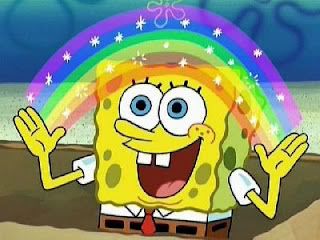
A study performed by Spanish researchers in 2006 came to a similar conclusion. When the experimenters asked their subjects "to read words with strong odor associations" and other, more neutral words, they discovered that the part of the brain associated with olfactory functions "lit up" when the smelly words were read but not when the neutral ones were. Metaphors when read or heard, according to Paul's article, had similar reactions in the brain when another experiment was done at Emory University in Atlanta, Georgia. A metaphor will cause the brain to create the object in the mind. "A monkey on your back." "The elephant in the room." The power of imagination is forming images in your head as you read these, whether you like it or not.
"The brain" according to Paul, "... does not make much of a distinction between reading about an experience and encountering it in real life; in each case, the same neurological regions are stimulated. Keith Oatley, an emeritus professor of cognitive psychology at the University of Toronto (and a published novelist), has proposed that reading produces a vivid simulation of reality, one that 'runs on minds of readers just as computers simulations run on computers.'" In the same way that hypnotists override the program of personality, so can books. During my trip to Portland over spring break (which I will discuss in more detail in my next blog), I went to Powell's book store, apparently the biggest such store in America. There, in the rare book section, I discovered the author Ormond McGill (what a cool first name). His book was selling for $70, and I didn't have long to look at it, but he discusses hypnosis and magic. Reading, in its own little way, is magical. It is the power to create worlds and to enter another's thoughts and feelings. Walter Ong mentions a man in Orality and Literacy who literally believed that the written word was magic. And it is; we just forgot it is. Each texture, hue, smell, or image we create while reading becomes alive inside us as our perfect representation of what that thing is. In this way, the world inside us is far more perfect than the world outside.
The act of engaging in a story also activates the part of our brain dealing with social interaction and empathy. Paul cites two researchers, Dr. Oatley and Dr. Mar, who wrote that "individuals who frequently read fiction seem to be better able to understand other people, emphasize with them and see the world from their perspective." By being an English major, you are becoming a way cooler person to talk to, and damn if you aren't able to understand people a little better too. How could you not if you were Skull Crusher of Morlack on Monday, the pretty belle of Alabama, Suzanna Bonnet, on Tuesday, and the Baroness of Castle Love on Wednesday? Not that you read those kind of books. Paul ends her article with a nice two sentences: "Reading great literature, it has long been averred, enlarges and improves us as human beings. Brain science shows this claim is true than we imagined." So, essentially, reading books is like exercising our social skills without being social with physical people. I can get behind that. I see how experiencing life through many different characters can widen your scope of humanity. Some communist, realist theorists really got behind this idea. And damn if I am not a communist in this case. Maybe. At any rate, reading lets us live things which we never could in our "normal" daily lives. It can give birth to anything you or anybody else has ever dreamed. Yes, it is magical. Amen, fellow English majors (or not, depending on who is reading this).
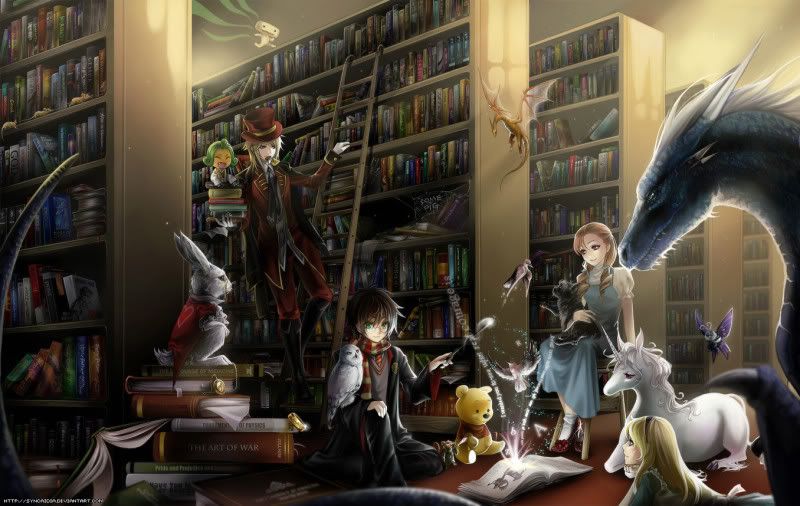
Monday, March 19, 2012
Guilio Camillo's Memory Theater
Guilio Camillo lived during the sixteenth century and was famous for his ideas on the memory theater and esoteric wisdom. His theater was a literal structure which a person could stand inside and debate like Cicero or remember everything from the beginning of time. Of course the poor man died before his secrets could be revealed to the kings who financed him or even his theater finished. Thankfully, the scholar Francis Yates has made him relevant again. Here is a small depiction of his fabled structure:
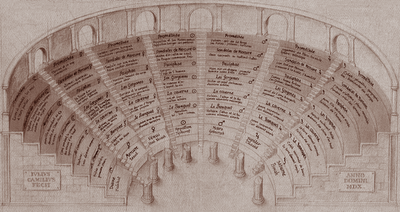
The stage in the center, peering at the theater in all its hierarchy, is the 'role' we play in everyday life. Yes, that role changes, often it seems, depending on who we are interacting with, but we are always 'us', that inscrutable unit in a strikingly desolate world hostile to our existence. We perform the child role, the friend role, the lover role, the spouse role, the parent role--in fact it changes with whomever we are interacting. Sean Kane goes as far as calling it a sort of dance. I will cover this more as I delve further into his Wisdom of the Mythtellers, less to say he describes how when we talk to someone, we are constantly moving with them, mimicking their actions, and generally performing nonverbal communication. If we were to speed up the process in something like a recorded video it would look very much like the dance Kane describes. Hindus have a word for this mock play: 'lila'. It is thus appropriate that Camillo's memory palace would be a theater with the roles reversed--the one on stage instead staring at the bleachers before him as opposed to the sitters in the stands watching him.
"The solitary 'spectator' of the Theatre," Yates says in The Art of Memory, "stands where the stage would be and looks toward the auditorium, gazing at the images on the seven times seven gates on the seven rising stands" (135). Of course, seven is a sacred number in the esoteric tradition. It is the number of observable planets in the sky (sun and moon included, notice 'planets' and 'planes'), as well as the number of days God needed to create the universe. Solomon, in Proverbs, was said to have constructed his wisdom from seven pillars, and also in the tradition there were seven Sephiroth "of the celestial and inferior worlds, in which are contained the Ideas of all things both in the celestial and the inferior worlds" (Yates 137). It is also the number of Watchers who fell to Earth in the Book of Enoch (Booth 103).
The exterior world is reflected in the interior, thus our bodies are astral bodies, home to the gods/planes.
After death, it is said, we will travel through the heavens, passing the 'planes' as our ego is gradually shredded after each encounter with one of the great gods. However, we are also given a gift by each as the spirit (the air) continues upward. We are first led by Hermes and then Lucifer because he is the necessary evil, the one who gives us desire for something more. This story, according to Mark Booth, is related to us in the tale of Sleeping Beauty, with the six fairies giving their gifts but the seventh the curse of sleep--the last god we encounter on the journey skyward is Saturn/Satan, who is the spirit of materialism. He is the one who makes us forget our journey. "Because of this intervention by Satan," says Booth, "humans gradually lose any consciousness, and eventually any memory, of their time among the heavenly hierarchies: 'Our birth is but a sleep and a forgetting'" (193). The Egyptians, when they mummified their pharaohs, were thus not preserving a body because they believed it would reawaken, but because it would draw the spirit back downward after its astral adventure. These tales of consciousness shredding are retold in many myths as the hero's journey. The only progression which man can achieve is through the desire of the ego. This ego must then undergo a transformation, or what Dr. Sexson would call a sort of alchemy. We, of course, experience this in everyday life. It is through the destruction of our narrative, our ego, our left brain's goals, that we can develop into something greater than our typical material hell permits us. Initiation was a representation of this process. It gave the experiencer a perceived death. Only when we confront our demise and realize that it is indeed an illusion that we can live in spiritual splendor. Francis Yates, in The Art of Memory, talks about how magicians in Egypt were said to be able to draw down the astral gods and enliven statues with their spirits. To the ancients this very well could be a realty because their perception of self, the ego, was so much different from our own.
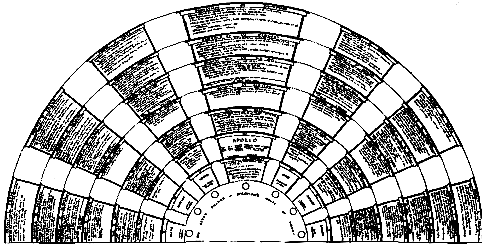
As history progressed and Saturn began to win his material war in the West, the spiritual was under constant attack. It was driven into esoteric ideas, to magic, to hypnosis, and tales of far away lands populated with creatures of the imagination. As the creeping blackness drove out the Mother, she was the one thrown to the edges of the map. In Camillo's Theater, the gods were perceived as ideas which could be interconnected with everything else. Each gate is also a history of consciousness, ala the Cabala and Hermes Trismegistus. As you move up the stairs and pass through each sphere, you are nearing the inferior world of materialism. Neoplatonists believed that the world in which we live was vulgar compared to the higher planes of ideas. There is no perfect tree, only the idea of a tree can be inviolate. Thus, if you became so attuned with the esoteric lore of ideas, you could actually commune with the gods and angels.
It is important that Camillo made Apollo his central deity. He is the god of rationality, the one who can shine his rays and vivify the rest. He is the overcoming of ignorance which can happen so easily when you roam the material plane. His organ is the compassionate 'heart'--it makes sense he would put Jupiter's favorite son at the 'heart' of his theater. It is said that some structures, such as the obelisk, dome, or modern day crop circles, can alter the people who step within them. It could be said that is also the case for Camillo's Theater, where you could orate like Cicero and know the secrets of the universe simply by standing inside. It was the perfect receptacle for the spirit of the gods. They could come back down to earth like they did so long ago. That was the purpose of the Theater in my opinion. It echoed the universe so perfectly that one could fully comprehend it. The imagination, of course, is important in this conception. Without it none of it is possible. If the perfect memory palace inside could be reflected outside, as would happen inside Camillo's theater, it would be similar to staring into a mirror like the Kabbalistic God did when he created the cosmos.
"The microcosm can fully understand and fully remember the macrocosm, can hold it within his divine mens or memory" Yates says on page 148. If one can move to the center of the Theater in his mind, he can access the rest at his ease. The images can be in perfect recall and put him in harmony with the universe, with the creative God. This is why the story of the lion encountering Camillo is so important--the solar deity enlivens the rest. It can give meaning to one thing and not take away from the others. The theater was a huge talisman to draw in Apollo, the solar deity, so he could be communicated with like the Delphic oracles did in Greece.
Camillo was said to have been spared by the loose lion. It licked him and saw in him a brother--the lion is the sun, like C.S. Lewis knew so well. He is the animal of Apollo. Camillo was thus the perfect rational, magical being who could rise above the rest. Camillo's Theater is Apollo's astral filing cabinet which a magician can access. Some see it as a precursor to the hypertextuality of the Modern world. There is no perfect book or story which can mean everything, so it must reference others--or all the others in Camillo's case.

The stage in the center, peering at the theater in all its hierarchy, is the 'role' we play in everyday life. Yes, that role changes, often it seems, depending on who we are interacting with, but we are always 'us', that inscrutable unit in a strikingly desolate world hostile to our existence. We perform the child role, the friend role, the lover role, the spouse role, the parent role--in fact it changes with whomever we are interacting. Sean Kane goes as far as calling it a sort of dance. I will cover this more as I delve further into his Wisdom of the Mythtellers, less to say he describes how when we talk to someone, we are constantly moving with them, mimicking their actions, and generally performing nonverbal communication. If we were to speed up the process in something like a recorded video it would look very much like the dance Kane describes. Hindus have a word for this mock play: 'lila'. It is thus appropriate that Camillo's memory palace would be a theater with the roles reversed--the one on stage instead staring at the bleachers before him as opposed to the sitters in the stands watching him.
"The solitary 'spectator' of the Theatre," Yates says in The Art of Memory, "stands where the stage would be and looks toward the auditorium, gazing at the images on the seven times seven gates on the seven rising stands" (135). Of course, seven is a sacred number in the esoteric tradition. It is the number of observable planets in the sky (sun and moon included, notice 'planets' and 'planes'), as well as the number of days God needed to create the universe. Solomon, in Proverbs, was said to have constructed his wisdom from seven pillars, and also in the tradition there were seven Sephiroth "of the celestial and inferior worlds, in which are contained the Ideas of all things both in the celestial and the inferior worlds" (Yates 137). It is also the number of Watchers who fell to Earth in the Book of Enoch (Booth 103).
The exterior world is reflected in the interior, thus our bodies are astral bodies, home to the gods/planes.
After death, it is said, we will travel through the heavens, passing the 'planes' as our ego is gradually shredded after each encounter with one of the great gods. However, we are also given a gift by each as the spirit (the air) continues upward. We are first led by Hermes and then Lucifer because he is the necessary evil, the one who gives us desire for something more. This story, according to Mark Booth, is related to us in the tale of Sleeping Beauty, with the six fairies giving their gifts but the seventh the curse of sleep--the last god we encounter on the journey skyward is Saturn/Satan, who is the spirit of materialism. He is the one who makes us forget our journey. "Because of this intervention by Satan," says Booth, "humans gradually lose any consciousness, and eventually any memory, of their time among the heavenly hierarchies: 'Our birth is but a sleep and a forgetting'" (193). The Egyptians, when they mummified their pharaohs, were thus not preserving a body because they believed it would reawaken, but because it would draw the spirit back downward after its astral adventure. These tales of consciousness shredding are retold in many myths as the hero's journey. The only progression which man can achieve is through the desire of the ego. This ego must then undergo a transformation, or what Dr. Sexson would call a sort of alchemy. We, of course, experience this in everyday life. It is through the destruction of our narrative, our ego, our left brain's goals, that we can develop into something greater than our typical material hell permits us. Initiation was a representation of this process. It gave the experiencer a perceived death. Only when we confront our demise and realize that it is indeed an illusion that we can live in spiritual splendor. Francis Yates, in The Art of Memory, talks about how magicians in Egypt were said to be able to draw down the astral gods and enliven statues with their spirits. To the ancients this very well could be a realty because their perception of self, the ego, was so much different from our own.

As history progressed and Saturn began to win his material war in the West, the spiritual was under constant attack. It was driven into esoteric ideas, to magic, to hypnosis, and tales of far away lands populated with creatures of the imagination. As the creeping blackness drove out the Mother, she was the one thrown to the edges of the map. In Camillo's Theater, the gods were perceived as ideas which could be interconnected with everything else. Each gate is also a history of consciousness, ala the Cabala and Hermes Trismegistus. As you move up the stairs and pass through each sphere, you are nearing the inferior world of materialism. Neoplatonists believed that the world in which we live was vulgar compared to the higher planes of ideas. There is no perfect tree, only the idea of a tree can be inviolate. Thus, if you became so attuned with the esoteric lore of ideas, you could actually commune with the gods and angels.
It is important that Camillo made Apollo his central deity. He is the god of rationality, the one who can shine his rays and vivify the rest. He is the overcoming of ignorance which can happen so easily when you roam the material plane. His organ is the compassionate 'heart'--it makes sense he would put Jupiter's favorite son at the 'heart' of his theater. It is said that some structures, such as the obelisk, dome, or modern day crop circles, can alter the people who step within them. It could be said that is also the case for Camillo's Theater, where you could orate like Cicero and know the secrets of the universe simply by standing inside. It was the perfect receptacle for the spirit of the gods. They could come back down to earth like they did so long ago. That was the purpose of the Theater in my opinion. It echoed the universe so perfectly that one could fully comprehend it. The imagination, of course, is important in this conception. Without it none of it is possible. If the perfect memory palace inside could be reflected outside, as would happen inside Camillo's theater, it would be similar to staring into a mirror like the Kabbalistic God did when he created the cosmos.
"The microcosm can fully understand and fully remember the macrocosm, can hold it within his divine mens or memory" Yates says on page 148. If one can move to the center of the Theater in his mind, he can access the rest at his ease. The images can be in perfect recall and put him in harmony with the universe, with the creative God. This is why the story of the lion encountering Camillo is so important--the solar deity enlivens the rest. It can give meaning to one thing and not take away from the others. The theater was a huge talisman to draw in Apollo, the solar deity, so he could be communicated with like the Delphic oracles did in Greece.
Camillo was said to have been spared by the loose lion. It licked him and saw in him a brother--the lion is the sun, like C.S. Lewis knew so well. He is the animal of Apollo. Camillo was thus the perfect rational, magical being who could rise above the rest. Camillo's Theater is Apollo's astral filing cabinet which a magician can access. Some see it as a precursor to the hypertextuality of the Modern world. There is no perfect book or story which can mean everything, so it must reference others--or all the others in Camillo's case.
Friday, March 9, 2012
The War on the Goddess, Part 3
1. The Masculine Sky God
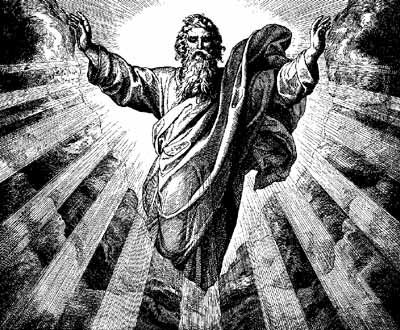
Mark Booth, in The Secret History of the World, says that the Elohim described in the Old Testament is actually written in Hebrew as plural. That is, the gods created the universe. After Lucifer tricked man into discovering the ego, one of the seven original gods split off to fight him. This was the moon, and the same God from the Old and New Testament. Shlain has many things to say about He who so relied on words to gain power. He is an indisputably male God, with his appellations, "Lord, Host, King, Ruler, and Master (The Alphabet Versus the Goddess, Shlain 82). He establishes his law by using the written word which underlines his masculinity, for the First Commandment announces the Female Goddess' departure completely, "I am the Lord thy God. Thou shalt have no other gods before me" (Exod. 20:2-3). Shlain calls this the most radical sentence ever written because it cuts the female aspect of the godhead from the cosmic framework. The Second Commandment, probably equally as radical, banishes images of the Father--this is also the disdain of the Mother, for she is the queen of myth and images. By saying he cannot be depicted emphasizes the importance of the written word.
Every Jewish boy must prove he can read at the age of 13 at his Bar Mitzvah. Reading thus tied the clan together. Written words, in their abstraction and linearity, gave rise to the ultimate abstract God, who cannot be depicted at all. "One explanation" according to Shlain, "[... is] they considered iconic information to be a threat to their newfound skill. Learning to think without resorting to images is indispensable to alphabet literacy" (Shlain 83). Yahweh is always emphasizing the written word. He commands Adam to name the animals in the garden, to gain power over them using his voice. He also emphasize time in the Fourth Commandment, by demanding of his followers to rest on the seventh day. Perhaps, the most fascinating of Shlain's incites is that "the Time Commandment lays the groundwork for the idea of justice, since a well-developed sense of linear time is necessary to conceive of punishment delayed and reward postponed. Non-literate people [...] do not conceive of time only as linear" (85), and instead see death as a "passage into another world." The Jews, in fact, do not even have a mythological afterlife.
Yahweh was the collision of the Paleolithic Sky God with the Linear, Literate God of Laws.

The Sky God was indeed a Paleolithic invention. Katherine Armstrong writes in A Short History of Myth,
This sky god eternally exists above us and only comes down to examine us like children or subjects in his court. He is not of this Earth, not like the Great Mother or Saturn/Satan. Armstrong continues "When they watched the waxing and waning of the moon, people saw yet another instance of sacred powers of regeneration, evidence of a law that was harsh and merciful, and frightening as well as consoling" (17). The seven day week is based on the quarter moon and the Muslim counter is still build around its cycles. However, this god is an absent God. He is the God people want to turn to for advice, for comfort, for guidance, for a wholeness which was lost long ago, which will free them from their own confused experiencing mind, caught between dualities. Each of us wishes to return to the "Golden Age", often symbolized by being inside the mother, then less so into childhood--the history of consciousness is not only the history of the world, but also the history of a single human life. The childhood stage is symbolized with Eden and in Esoteric wisdom Adam's vegetable arms stretch across space like a cross, where God's desire for humans, and humans' desire God met again on the Cross. A Golden Age when our minds were one with the gods, before we were trapped in a world of death and consequences.
This kingly God which the West so firmly believes (or disbelieves) originated with the gods in the Middle East, passed down from the Paleolithic tribe people's sky gods. It was here where a state or king was said to be ruled over by a great supernatural force. These gods existed to give the ruler divine right. We see the city of Babylon being ruled over by Marduk, who slew the great mother, Tiamat, and made humans from her lover's blood. It is a tyrannical male fantasy, and one from the lawful, literate culture of the Babylonians. Monarchy gave rise to King-Gods. The Egyptians, the Romans, and the Muslims did this--the right to be king guaranteed through deification. Because religion fomented in this region was wielded by such authority, the God we received today is a Monarchical God. Our churches are built like court rooms, you pay homage to him, you worship him, you pray for his guidance, you are his subject, and in the end, his slave. Along with this myth comes the World as an Artifact. It was made a long time ago by the potter god, the carpenter god (Jesus is the son of a carpenter) and handed to us as our own. This interpretation of the bible is undynamic--it's a diluted, dead thing; is it no wonder it is in the West where atheism grew the most? Alan Watts calls this the myth of the Ceramic Universe. We feel separated from it--as objects, as nouns--not part of the greater whole. This idea is extrapolated in our own bodies, where we believe that the brain governs the rest of the organs. But couldn't one as easily say that the stomach evolved the brain to feed itself? Westerners live out of harmony with their own bodies. The ancients believed that each organ was controlled by a different deity reflected in the heavens.
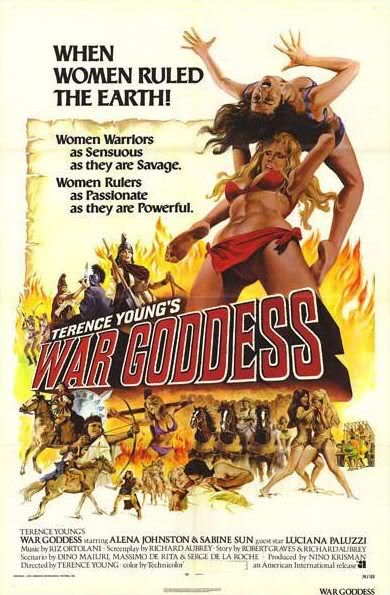
2. Western Minds
Western minds are raw, full of stress that they don't have enough money or a loved one is going to come down with a sickness and die. This absent father, a father we need because our universe is a universe of laws, should be filled with a myth about the proper way to live offered by a comforting society. Instead, we have a God who exists above us, rules us, and we have to obey his laws. No one really believes in him--they feel they ought to, and people who actually do are on the sides of the streets with blow horns, even good Christians calling them crazy. Material America is God's system, but God is extirpated from it. We still live by his rules, but don't accept his existence. God is dead, and we are looking for someone to follow in his stead, but in America, you are in a vacuum. There are no grand mystery religions for the average person to turn. There are no stories recited by a shaman or a bard. All we have is the amphitheater of corporate produced movies and bought-out mega-churches. The American Dream is a personal dream. We know the end goal, to be rich, to be famous, to be respected, but we don't know how to arrive there. Tyler Durden, played by Brad Pitt says in Fight Club,
Americans are craving real experiences. Our culture fetishises war and death because it is only in these states do we know we are alive. Violence permeates our movies--explosions, war, arms and legs getting hacked off, and people screaming as they get shot. This fetishation is similar to prohibition. We fear death so much that it becomes sexy. We no longer realize it's an illusion even when one of our greatest American poets, Walt Whitman, tried so hard to tell us. The founding fathers would have been horrified by the state we have created. They believed in the infallibility of the truly enlightened man who stood outside partisanship. They trusted that the citizens of the United States would have enough power to look after themselves and not rely on government. But America isn't enlightened anymore. We have bought too much into the universe of laws, with the Religious and the Scientific Academics waging war on one another, trying to prove or disprove whether God exists in a material sense. This is the result of literacy, of Saturn's laws, and complete and utter Statism will be the result. Secular liberals are likewise trying to turn to government to fulfill the need of a guiding father. Christians turn to their hegemonic Church, and in today's Islam, Muslims turn to their spiritual leaders like the Ayatollah in Iran or fundamentalist heroes like Osama bin Laden. These leaders and apparatuses are always corrupted because of human imperfection--a perfect state would be, like Joseph Campbell said, inhuman. It is also surprisingly based on Utopianism, a very Christian idea of a New Jerusalem.
3. Imperfection
Something which would have been lovable under different circumstances can be the tragic flaw in a complete authoritarian dictator, causing tyranny. When humans are thrust to the level of gods they collapse under the pressure. In Egyptian and Roman civilization, the leader would be a living, walking god. In today's culture, celebrities become archetypes, brands, themselves. However, no human can be a perfect representation of an idea--they can never become the absolute which society demands from them. There is no perfect, bias-free, discerning judge (as symbolized by the Greek Justice who is emblazoned across in America in front of public buildings). There is no perfect evil as represented by Saddam Hussein or Osama bin Laden. There is no perfect good--the president of the United States, Church leaders, or boy-scouts. There is an archetypal public face and there is the real person. When we meet celebrities, it almost like we are meeting a God face to face. But humans are fallible, and we should never put complete faith in them. They break down, lie, cheat, steal, murder, and act selfishly--"I've seen good men do bad things, and bad men do good things" says Clancy Brown's character in "Cowboys and Aliens". The only faith is the faith we have in ourselves and the ones we love, not a government run by corruptible politicians and nameless goons. In the end, they are the forces of Satan/Saturn, taking away the people's rights as they suck dry any vestige of freedom. By seeing God as a king who lives far away and yourself as one of his subjects who has give your life to him, you also lose freedom. Laws, lines in the sand, these make us want to walk over them, to dabble in the darkside. Only by knowing both worlds can we exist without corrupting ourselves. Why did people get rid of God in the first place? Guilt.
God, this transcendent spirit, imagination, unlimited potential--it exists inside of you. Was not the universe said to be created by the imaginative spirit of a lonely God? We need a new, healthy system, not a world religion which is easily corruptible by the foxes in control. We need the structure, the stories, for our own personal enlightenment, to "follow our bliss". Being famous shouldn't be an end goal (though this grew out of America as well and our desire to be remembered), being rich shouldn't be an end--these don't fulfill us. Our government, our rulers controlled by banks and multinational corporations, has fed us this great American Dream. Why? To enslave us with debt. Where before being a mother was heroic, being a good father was heroic, becoming a man was heroic--these are no longer goals that are respected by the majority of Americans. Our movies preach to us the importance of societal recognition (on steroids with the Super Hero craze), of the desire to be wealthy. What about Tennyson's "Ulysses"? They never show us what happens after the villain is killed or thrown in jail and the woman is in the hero's arms. The government is instead lobbing off the self-empowering structures and making us dependent on the mother sow offering her engorged tit at the expense of people already standing on their own two feet. How do they this? By lying to us, selling a dream of a perfectly equal world run by benevolent philosopher-kings. By distracting us with sports, politics, and reality television. By surreptitiously making laws under the cover of darkness. In the end, the God the West has functioned with for over 1,000 years is a material one--since he is this way, life is given the most intense meaning. It is here where you decide your eternal reward or punishment. A God-fearing person in the end, is a death-fearing person. Zarathustra's famous quote, "He who fears death, is already dead" is true. We must break free of the matrix and look through whole new eyes.
The first image is of the the Great Mother wiggling, wiggling all around like a fish caught in a net--Saturn is the net then. You catch the great wiggly beasts in events and things. The truth is, everything, every object is a verb, a wave. The tree is treeing. The dog is dogging. The cat is catting. We, through the power of Saturn, separate the great drama so we can study it, control it, but we forget that there is more than just the boxing. This is the work of Saturn alright, with his great scythe chopping everything into bits. Nothing ever ends, it just changes. We picture our lives from birth to death, that's it. There is nothing you can do to stop it. "Oh vanity of vanities, all is vanity," Solomon said in the tradition. By seeing God as a distant father, by seeing ourselves as alien objects cut from the wiggly thing, we make ourselves miserable. Both government and the King-God must make us fear death, so he can keep on ruling--you see now? People in charge control and manipulate us with the fear of our own demise. Death isn't a bad thing. Death isn't real. It's illusion someone created long ago to keep the lions in line. We are all Antony's in Shakespeare's "Antony and Cleopatra". The great material Augustus Caesar, with his geometry, columns, and rules and Cleopatra with the overflowing Nile and passion. The Great Mother Goddess--we are all caught in between these two. When Cleopatra died, she knew physical being was temporary, but ideas last forever.
4. Faces of the Enemy
In Sam Keen's "Faces of the Enemy", he shows how nations make abstract images to create an absolute enemy to wage war upon. As he carouses through different culture's propaganda, he says,
Images, according to Leonard Shlain, were the realm of the mother--but I think what we see here is the modern literate society's perversion of the ancient art. Hieroglyphs were the gods' alphabet. They represented not abstract ideals, but things from the living world. However, after an image is created, it can take on a life of its own, especially in a literate culture which has perfected the abstract. Concepts of love, hate, good, evil, black, white, binaries, it seems, are the result of the left brain's exclusive boxing. It allows us to create the concept of 'I', the ego; while the right brain gives us a holistic intuitiveness, a sense of not being you verse the world, but being part of it. The masculine brain accelerated war because it made it more personal--good (us) versus evil (them). It is relevant that the concept of good and evil also appeared to arrive with the creation of the alphabet.
In the next video Keen interviews the convicted killer, David Rice:
It really struck me that during the interview, when Rice says it would have been easier not to talk at all, Keen agrees. It would have been so much easier to make an absolute enemy and to hate indiscriminately. Written word gives life to this idea. It divides the world into pieces, into little absolute images of the perfect ideal of things, making nouns do verbs, not verbs do nouns. Namely, the creation of an abstract God let us be self-righteous. We can call ourselves 'good'. We can form groups which are 'good'. And we can justify committing genocide as the Hebrews did on the Philistines. This can only happen when we sequester ourselves or our group from the rest of the world by creating narratives from our memories.
When we are the ultimate hero in our story, there must also be enemies. The book, the drama, have influenced our consciousnesses. When we see ourselves as separated from everything else, as written language can allow us to do so easily, it dehumanizes others. In my mind, I am seeing a perfectly white 2D box floating forward, pushing away black boxes, or being helped along by other white ones. Our literate culture deals so often with binaries that we forget that the opposite is what defines us. It appears it was this culture which created racism, slavery, misogyny, and stereotypes, because it is easier to exclude than include. This form of thinking is derived from logos or linear thought. This happened because this happened because this happened. The enemy is evil because he killed one of our brothers because his god is evil because his skin is dark because he worships demons... on and on. It is also true that when we wear masks, as recorded by Philip Zimbardo, we are capable of doing terrible things because it is simpler to start seeing ourselves as being abstract. We are no longer 'us' because the mask hides us. Here is a Ted Talks video by Philip Zimbardo:
and another by Aaron Dykes about how this can be used to control us:
It is easier to con someone who uses abstract thinking. His mind will attempt to justify his or others actions based on reason and logos, while someone from an oral culture will simply see things as they are. Walter Ong reported this fact in his nine characteristics of orally based thought and expression. We are easily manipulated into believing fiat currency has value because it 'represents' something with value. Would an orally based culture ever be able to put value on worthless paper?
What is known is that an abstract, ideal world would make life so much easier. It is a constant fantasy of many to be told what to do, to know who the enemy is, and to know your goal with all your heart. Soldiers often look back on war fondly because of this. It gave clarity and purpose without the ambiguity of normal life. This is the realm of the abstract ideal--Plato's realm of perfect spheres without ego, the lost paradise of Eve. Everything simply makes sense. "We're war making animals" claims someone in Keen's movie. This is true in the fact that living in a world of relativity is hard--it would be easier if we could follow orders like in the Milgram experiments described in the videos above. It would rid us of constantly questioning if our actions were right. I have often made this comparison: just as religious people can give their lives over to God to rid themselves of doubt, so can statists give their identity over to the absolute utopian state. The only truth is the god in ourselves. Indians treat guests so well because they recognize that everyone is a visiting deity. Like God, our nation, our group, we are the perfect good, and propaganda is used to create the perfect evil. It dehumanizes them and allows us to kill without guilt. Confucius said, "If you want to change society, call things as they really are." If we could recognize this fact when we are declaring war on another country, pumping our banks with billions of dollars, or continuing to make certain drugs illegal, then we may be able to start living like a healthy society again.
Abstract thought is, of course, the realm of the left brain and Saturn. It is not a place of enlightenment because he is the god who wants to eat the universe and render it into feces, unordered mass. Now for a fun David Icke video:
Images can be used to control us when we do not know their intention. They are simply frequencies which we choose to see or don't see. Check out this video where even advertisers can be taken in by subliminal messaging.
My Political Science text book, World Politics Trend and Transformation by Kegley and Blanton, reports that "the repeated outbreak of war has led some, such as psychiatrist Sigmund Freud, to conclude that aggression is an instinctive part of human nature that stems from humans' genetic psychological programming" (253). There are many theories to explain why this; however, it also appears we are driven by the need for community and consensus because we are a social animal. A global outlook is in the end a result of the feminine right brain, and individualism that of the masculine left. Again, we see the war playing out both in the material and mental arenas. World Politics continues, "most social scientists now strongly disagree with the realist premise that because humans are essentially selfish, they are also aggressive and murder and kill because of their innate genetic drives to act aggressively. Instead they interpret war as a learned cultural habit" or socialization (254). Feminist theory argues that war and conflict are "rooted in the masculine ethos of realism". It is true that one of the most tell-tale signs of an unstable country are its treatment of women--"where cultural norms condone the mistreatment of women and deny them opportunities for education and employment, the outbreak of civil war is high" (258).
Again, we must return to Leonard Shlain. Literate society has increased our sense of individualism. It created a personal, omniscient, omnipotent God. It made us see ourselves as nouns and not verbs. It separated us from the cosmos, making us the hero and our enemies the villain. It was the birth of drama, which the three Greek playwrights were so famous for. Yes, the masculine brain is the home of war. However, like all things there is a balancing act. The left hemisphere is the home of action and the right the realm of dreaming. Celtic mythology relates to us the mythic female Otherworld, so dictated by the seasons, but ineffectual because it cannot affect the physical plain. Meanwhile, the masculine material world is where men go to war and things are actually done. Sean Kane, in The Wisdom of the Mythtellers, relates, "Free of laws of time and space, and omniscient, [the Otherworld] is curiously powerless in matters involving the division and possession of things. The inferior power is the power of a world constructed by men: aggressive, practical, tool-using, naming, active, purposeful--the world of time and space. For all its ability to measure and compare, it is in danger of ignoring the mystery of fertility on which it depends. Each pursing its own end, the two worlds sustain each other mutually" (Kane 179). We can see this division by how the Celts and Romans determined their year: the Celts followed the seasons, the Romans the sun's progression.
5. A New Age
In George Friedman's books, The Next 100 Years, he describes Osama bin Laden's "Letter to America". In the warning, the infamous killer wrote: "You are a nation that exploits women like consumer products or advertising tools, calling upon customers to purchase them. You use women to serve passengers, visitors, and strangers to increase your profit margins. You then rant that you support the liberation of women." Friedman claims that this doctrine is at the heart of Al Qaeda's principles--the family is a unit which shouldn't be messed with. Friedman says, "First, the home is the domain of the woman and life outside the house is the purview of the man. Second, sexuality is something confined to the family and the home, and extramarital, extrafamilial sexuality is unacceptable. Women who move outside the home invite extramarital sexuality just by being there. Third, women have as their primary tasks reproductions and nurturing of the next generations" (Friedman 49). The Middle East may be one of the most blatant battlefields in the war on the Goddess. It is hear where she has been banished from outword life completely. In America, it is a known fact that the Rockefellers were a supporter of the women's liberation movement during the 1960s. Some have claimed this was a conspiracy to get the women out of the home and split up the family, as well as increase tax revenue. You can find many articles online which deal with man's deminished role in modern society as a result of this. Henry Makow, for one example, has a site named Save the Males with articles like How the Rockefellers Re-Engineered Women and Satanic Baby is Poster-Child for Parenthood. Women's brain are different from men's. In John Gray's book Venus on Fire, Mars on Ice, he describes how women are not as capable of turning off stress because they cannot wield the hormone serotonin (stress-reliever) when they are in a state of high tension.
There is clearly something in the wind when it comes to male-female relations. Conservatives around the world are feeling threatened by the liberation of women and this "conflict is going to intensify in the twenty-first century, but the traditionalists are fighting a defensive and ultimately losing battle. The reason is that over the past hundred years the very fabric of human life--and particularly the life of women--has been transformed, and with it the structure of the family. What has already happened in Europe, the United States, and Japan is spreading to the rest of the world. These issues will rip many societies apart, but in the end, the transformation of the family can't be stopped" (Friedman 49). The reason, Friedman claims, is because of industrialization and the demographic change it foments. Where before children were an asset to a working family, they are now a liability. Kids are expensive. Parents have to support them for the first 18 years of life, pay for their college, and often harbor them again after they graduate. To be a productive member in society in a Western country you need years of schooling. This is a result of the Heckscher-Ohlin theorem and the increasing automation of machines. America is relatively well-endowed with high skill labor so the demand for these types of jobs are increasing, but the demand for relatively low-skill labor is decreasing. As the US advances, there will continue to be a greater demand for engineers and other high skill workers because they will be the only ones who can maintain the machines. Joseph Stiglitz wrote a fantastic article in Vanity Fair titled The Book of Jobs. In it he describes this very process: how technology has resulted in less demand for low skill labor and forced many people to use debt to continue living the way they were. Another article in the Economist also talks about this phenomenon. This shift is also causing a demographics bubble--one that will play out in the next 100 years as a greater number of older people have to be supported by fewer younger ones.
The world is changing before our eyes. No longer are manly jobs as necessary because the world is feminizing. Men have few outlets to release their aggression, not even in the work place. Women's needs are different and are not being met in the home or at their jobs either. By not acknowledging the difference in the male/female mind, we are making everyone miserable. One can see this tension play out in movies like "Fight Club" and television shows like "Breaking Bad". Because of the fewer children humanity is having, women will have to continue to work to support the old and their own children, and this isn't a transformation only happening in the West, it is occurring all over the world. "According the United Nations," Friedman says, "women had an average of 4.5 children in 1970. In 2000, that number had dropped to 2.7 children. Remember, this is a worldwide average. That is a dramatic crop and explains why the population continued to grow, but more slowly than before" (Friedman 52). Some more interesting facts reported by Friedman include people putting off marriage until later--"two hundred years ago, women started having children in their early teens. Women continued having children, nurturing them, and frequently burying them until they themselves died" (56). Women now only spend two years of their lives pregnant and only eight-years in "full-time nurturing". Since they spend a less percentage of their time raising kids, women will continue to become less dependent on men. "Marriage is no longer imposed by economic necessity" (56). The troubadours sang of romantic love hundreds of years ago. Only now can their dream fully be realized; however, unlike the marriage of before which brought people together through economic needs, now it is through complete love. And love, well love comes and goes. The trend of marrying later, having premarital sex, cannot be changed. "Family is [no longer] the critical economic instrument it once was. Divorce is no longer economically catastrophic, and premarital sex is inevitable. Homosexuality--and civil unions without reproduction--also become unextraordinary" (58).
The computer, according to Friedman, is the true symbol of everything American. It is completely pragmatic, interpreting information by using only logic and reason in languages like C++. "The charge against American culture is that is has elevated the practical beyond all other forms of truth. The charge is valid, but it also fails to appreciate the power of that reduction. It is in the practical that history is made" (61). It is America where the great spiritual battle of our age will take place. Women are not being acknowledged because they are special, but because they are like everybody else. This is not the way of the Goddess either, who is supremely spiritual and mythological--she is magical, while the male is logical. It is also where technology will continue to progress to the invention of information tech, robotics, nano-tech, and biological augmentations, the singularity which Ray Kurzweil has philosophized about. Walter Ong talked about a secondary orality, well, it seems to me that we will progress past that to secondary humanity. These technologies are going to continue to change us into something beyond human. They will link us together more than ever before, give us powers of perception which our ancestors never had, and meld our bodies with robotics. By completely destroying the Mother and spirituality, we are being brought closer to her again through logos. We are coming full circle. Conferences are being held at prestigious universities which talk about communicating with the divine through computers (sorry, I cannot find a link right now). Theologists like Tom Horn worry about breaking through Forbidden Gates and communicating with demons. The world of man is screaming with anxiety. Who is going to be the authority in a world where everyone is god? It really is the question of our age.
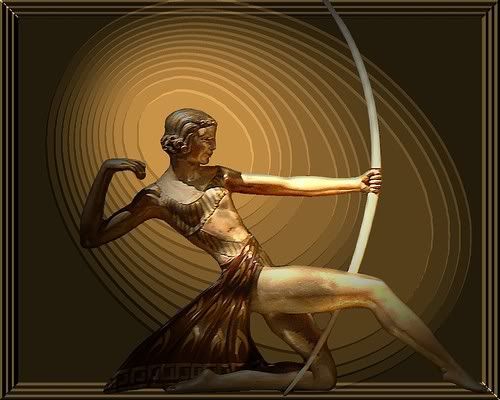

Mark Booth, in The Secret History of the World, says that the Elohim described in the Old Testament is actually written in Hebrew as plural. That is, the gods created the universe. After Lucifer tricked man into discovering the ego, one of the seven original gods split off to fight him. This was the moon, and the same God from the Old and New Testament. Shlain has many things to say about He who so relied on words to gain power. He is an indisputably male God, with his appellations, "Lord, Host, King, Ruler, and Master (The Alphabet Versus the Goddess, Shlain 82). He establishes his law by using the written word which underlines his masculinity, for the First Commandment announces the Female Goddess' departure completely, "I am the Lord thy God. Thou shalt have no other gods before me" (Exod. 20:2-3). Shlain calls this the most radical sentence ever written because it cuts the female aspect of the godhead from the cosmic framework. The Second Commandment, probably equally as radical, banishes images of the Father--this is also the disdain of the Mother, for she is the queen of myth and images. By saying he cannot be depicted emphasizes the importance of the written word.
Every Jewish boy must prove he can read at the age of 13 at his Bar Mitzvah. Reading thus tied the clan together. Written words, in their abstraction and linearity, gave rise to the ultimate abstract God, who cannot be depicted at all. "One explanation" according to Shlain, "[... is] they considered iconic information to be a threat to their newfound skill. Learning to think without resorting to images is indispensable to alphabet literacy" (Shlain 83). Yahweh is always emphasizing the written word. He commands Adam to name the animals in the garden, to gain power over them using his voice. He also emphasize time in the Fourth Commandment, by demanding of his followers to rest on the seventh day. Perhaps, the most fascinating of Shlain's incites is that "the Time Commandment lays the groundwork for the idea of justice, since a well-developed sense of linear time is necessary to conceive of punishment delayed and reward postponed. Non-literate people [...] do not conceive of time only as linear" (85), and instead see death as a "passage into another world." The Jews, in fact, do not even have a mythological afterlife.
Yahweh was the collision of the Paleolithic Sky God with the Linear, Literate God of Laws.

The Sky God was indeed a Paleolithic invention. Katherine Armstrong writes in A Short History of Myth,
"Some of the earliest myths [...] were associated with the sky, which seems to have given people their first notion of the divine. When they gazed at the sky--infinite, remote, and existing quite apart from their puny lives -- people had a religious experience. The sky towered above them, inconceivably immense, inaccessible and eternal. It was the very essence of transcendence and otherness. Human beings could do nothing to affect it. The endless drama of its thunderbolts, eclipses, storms, sunsets, rainbows and meteors spoke of another endlessly active dimension, which had a dynamic life of its own" (Armstrong 18).
This sky god eternally exists above us and only comes down to examine us like children or subjects in his court. He is not of this Earth, not like the Great Mother or Saturn/Satan. Armstrong continues "When they watched the waxing and waning of the moon, people saw yet another instance of sacred powers of regeneration, evidence of a law that was harsh and merciful, and frightening as well as consoling" (17). The seven day week is based on the quarter moon and the Muslim counter is still build around its cycles. However, this god is an absent God. He is the God people want to turn to for advice, for comfort, for guidance, for a wholeness which was lost long ago, which will free them from their own confused experiencing mind, caught between dualities. Each of us wishes to return to the "Golden Age", often symbolized by being inside the mother, then less so into childhood--the history of consciousness is not only the history of the world, but also the history of a single human life. The childhood stage is symbolized with Eden and in Esoteric wisdom Adam's vegetable arms stretch across space like a cross, where God's desire for humans, and humans' desire God met again on the Cross. A Golden Age when our minds were one with the gods, before we were trapped in a world of death and consequences.
This kingly God which the West so firmly believes (or disbelieves) originated with the gods in the Middle East, passed down from the Paleolithic tribe people's sky gods. It was here where a state or king was said to be ruled over by a great supernatural force. These gods existed to give the ruler divine right. We see the city of Babylon being ruled over by Marduk, who slew the great mother, Tiamat, and made humans from her lover's blood. It is a tyrannical male fantasy, and one from the lawful, literate culture of the Babylonians. Monarchy gave rise to King-Gods. The Egyptians, the Romans, and the Muslims did this--the right to be king guaranteed through deification. Because religion fomented in this region was wielded by such authority, the God we received today is a Monarchical God. Our churches are built like court rooms, you pay homage to him, you worship him, you pray for his guidance, you are his subject, and in the end, his slave. Along with this myth comes the World as an Artifact. It was made a long time ago by the potter god, the carpenter god (Jesus is the son of a carpenter) and handed to us as our own. This interpretation of the bible is undynamic--it's a diluted, dead thing; is it no wonder it is in the West where atheism grew the most? Alan Watts calls this the myth of the Ceramic Universe. We feel separated from it--as objects, as nouns--not part of the greater whole. This idea is extrapolated in our own bodies, where we believe that the brain governs the rest of the organs. But couldn't one as easily say that the stomach evolved the brain to feed itself? Westerners live out of harmony with their own bodies. The ancients believed that each organ was controlled by a different deity reflected in the heavens.

2. Western Minds
Western minds are raw, full of stress that they don't have enough money or a loved one is going to come down with a sickness and die. This absent father, a father we need because our universe is a universe of laws, should be filled with a myth about the proper way to live offered by a comforting society. Instead, we have a God who exists above us, rules us, and we have to obey his laws. No one really believes in him--they feel they ought to, and people who actually do are on the sides of the streets with blow horns, even good Christians calling them crazy. Material America is God's system, but God is extirpated from it. We still live by his rules, but don't accept his existence. God is dead, and we are looking for someone to follow in his stead, but in America, you are in a vacuum. There are no grand mystery religions for the average person to turn. There are no stories recited by a shaman or a bard. All we have is the amphitheater of corporate produced movies and bought-out mega-churches. The American Dream is a personal dream. We know the end goal, to be rich, to be famous, to be respected, but we don't know how to arrive there. Tyler Durden, played by Brad Pitt says in Fight Club,
"Man, I see in fight club the strongest and smartest men who've ever lived. I see all this potential, and I see squandering. God damn it, an entire generation pumping gas, waiting tables; slaves with white collars. Advertising has us chasing cars and clothes, working jobs we hate so we can buy shit we don't need. We're the middle children of history, man. No purpose or place. We have no Great War. No Great Depression. Our Great War's a spiritual war... our Great Depression is our lives. We've all been raised on television to believe that one day we'd all be millionaires, and movie gods, and rock stars. But we won't. And we're slowly learning that fact. And we're very, very pissed off."
Americans are craving real experiences. Our culture fetishises war and death because it is only in these states do we know we are alive. Violence permeates our movies--explosions, war, arms and legs getting hacked off, and people screaming as they get shot. This fetishation is similar to prohibition. We fear death so much that it becomes sexy. We no longer realize it's an illusion even when one of our greatest American poets, Walt Whitman, tried so hard to tell us. The founding fathers would have been horrified by the state we have created. They believed in the infallibility of the truly enlightened man who stood outside partisanship. They trusted that the citizens of the United States would have enough power to look after themselves and not rely on government. But America isn't enlightened anymore. We have bought too much into the universe of laws, with the Religious and the Scientific Academics waging war on one another, trying to prove or disprove whether God exists in a material sense. This is the result of literacy, of Saturn's laws, and complete and utter Statism will be the result. Secular liberals are likewise trying to turn to government to fulfill the need of a guiding father. Christians turn to their hegemonic Church, and in today's Islam, Muslims turn to their spiritual leaders like the Ayatollah in Iran or fundamentalist heroes like Osama bin Laden. These leaders and apparatuses are always corrupted because of human imperfection--a perfect state would be, like Joseph Campbell said, inhuman. It is also surprisingly based on Utopianism, a very Christian idea of a New Jerusalem.
3. Imperfection
Something which would have been lovable under different circumstances can be the tragic flaw in a complete authoritarian dictator, causing tyranny. When humans are thrust to the level of gods they collapse under the pressure. In Egyptian and Roman civilization, the leader would be a living, walking god. In today's culture, celebrities become archetypes, brands, themselves. However, no human can be a perfect representation of an idea--they can never become the absolute which society demands from them. There is no perfect, bias-free, discerning judge (as symbolized by the Greek Justice who is emblazoned across in America in front of public buildings). There is no perfect evil as represented by Saddam Hussein or Osama bin Laden. There is no perfect good--the president of the United States, Church leaders, or boy-scouts. There is an archetypal public face and there is the real person. When we meet celebrities, it almost like we are meeting a God face to face. But humans are fallible, and we should never put complete faith in them. They break down, lie, cheat, steal, murder, and act selfishly--"I've seen good men do bad things, and bad men do good things" says Clancy Brown's character in "Cowboys and Aliens". The only faith is the faith we have in ourselves and the ones we love, not a government run by corruptible politicians and nameless goons. In the end, they are the forces of Satan/Saturn, taking away the people's rights as they suck dry any vestige of freedom. By seeing God as a king who lives far away and yourself as one of his subjects who has give your life to him, you also lose freedom. Laws, lines in the sand, these make us want to walk over them, to dabble in the darkside. Only by knowing both worlds can we exist without corrupting ourselves. Why did people get rid of God in the first place? Guilt.
God, this transcendent spirit, imagination, unlimited potential--it exists inside of you. Was not the universe said to be created by the imaginative spirit of a lonely God? We need a new, healthy system, not a world religion which is easily corruptible by the foxes in control. We need the structure, the stories, for our own personal enlightenment, to "follow our bliss". Being famous shouldn't be an end goal (though this grew out of America as well and our desire to be remembered), being rich shouldn't be an end--these don't fulfill us. Our government, our rulers controlled by banks and multinational corporations, has fed us this great American Dream. Why? To enslave us with debt. Where before being a mother was heroic, being a good father was heroic, becoming a man was heroic--these are no longer goals that are respected by the majority of Americans. Our movies preach to us the importance of societal recognition (on steroids with the Super Hero craze), of the desire to be wealthy. What about Tennyson's "Ulysses"? They never show us what happens after the villain is killed or thrown in jail and the woman is in the hero's arms. The government is instead lobbing off the self-empowering structures and making us dependent on the mother sow offering her engorged tit at the expense of people already standing on their own two feet. How do they this? By lying to us, selling a dream of a perfectly equal world run by benevolent philosopher-kings. By distracting us with sports, politics, and reality television. By surreptitiously making laws under the cover of darkness. In the end, the God the West has functioned with for over 1,000 years is a material one--since he is this way, life is given the most intense meaning. It is here where you decide your eternal reward or punishment. A God-fearing person in the end, is a death-fearing person. Zarathustra's famous quote, "He who fears death, is already dead" is true. We must break free of the matrix and look through whole new eyes.
The first image is of the the Great Mother wiggling, wiggling all around like a fish caught in a net--Saturn is the net then. You catch the great wiggly beasts in events and things. The truth is, everything, every object is a verb, a wave. The tree is treeing. The dog is dogging. The cat is catting. We, through the power of Saturn, separate the great drama so we can study it, control it, but we forget that there is more than just the boxing. This is the work of Saturn alright, with his great scythe chopping everything into bits. Nothing ever ends, it just changes. We picture our lives from birth to death, that's it. There is nothing you can do to stop it. "Oh vanity of vanities, all is vanity," Solomon said in the tradition. By seeing God as a distant father, by seeing ourselves as alien objects cut from the wiggly thing, we make ourselves miserable. Both government and the King-God must make us fear death, so he can keep on ruling--you see now? People in charge control and manipulate us with the fear of our own demise. Death isn't a bad thing. Death isn't real. It's illusion someone created long ago to keep the lions in line. We are all Antony's in Shakespeare's "Antony and Cleopatra". The great material Augustus Caesar, with his geometry, columns, and rules and Cleopatra with the overflowing Nile and passion. The Great Mother Goddess--we are all caught in between these two. When Cleopatra died, she knew physical being was temporary, but ideas last forever.
4. Faces of the Enemy
In Sam Keen's "Faces of the Enemy", he shows how nations make abstract images to create an absolute enemy to wage war upon. As he carouses through different culture's propaganda, he says,
"the first thing that caught my attention was that all nations use basically the same visual metaphors, the same hostile cliches, to characterize, to dehumanize their enemies. It's as if all these propaganda artists went to the same art school. The enemy is always a demon, a barbarian, the aggressor, a lier, a madman, or some vile animal that can be exterminated without regret. Before we make war, even before we make weapons, we make an idea of the enemy."
Images, according to Leonard Shlain, were the realm of the mother--but I think what we see here is the modern literate society's perversion of the ancient art. Hieroglyphs were the gods' alphabet. They represented not abstract ideals, but things from the living world. However, after an image is created, it can take on a life of its own, especially in a literate culture which has perfected the abstract. Concepts of love, hate, good, evil, black, white, binaries, it seems, are the result of the left brain's exclusive boxing. It allows us to create the concept of 'I', the ego; while the right brain gives us a holistic intuitiveness, a sense of not being you verse the world, but being part of it. The masculine brain accelerated war because it made it more personal--good (us) versus evil (them). It is relevant that the concept of good and evil also appeared to arrive with the creation of the alphabet.
In the next video Keen interviews the convicted killer, David Rice:
It really struck me that during the interview, when Rice says it would have been easier not to talk at all, Keen agrees. It would have been so much easier to make an absolute enemy and to hate indiscriminately. Written word gives life to this idea. It divides the world into pieces, into little absolute images of the perfect ideal of things, making nouns do verbs, not verbs do nouns. Namely, the creation of an abstract God let us be self-righteous. We can call ourselves 'good'. We can form groups which are 'good'. And we can justify committing genocide as the Hebrews did on the Philistines. This can only happen when we sequester ourselves or our group from the rest of the world by creating narratives from our memories.
When we are the ultimate hero in our story, there must also be enemies. The book, the drama, have influenced our consciousnesses. When we see ourselves as separated from everything else, as written language can allow us to do so easily, it dehumanizes others. In my mind, I am seeing a perfectly white 2D box floating forward, pushing away black boxes, or being helped along by other white ones. Our literate culture deals so often with binaries that we forget that the opposite is what defines us. It appears it was this culture which created racism, slavery, misogyny, and stereotypes, because it is easier to exclude than include. This form of thinking is derived from logos or linear thought. This happened because this happened because this happened. The enemy is evil because he killed one of our brothers because his god is evil because his skin is dark because he worships demons... on and on. It is also true that when we wear masks, as recorded by Philip Zimbardo, we are capable of doing terrible things because it is simpler to start seeing ourselves as being abstract. We are no longer 'us' because the mask hides us. Here is a Ted Talks video by Philip Zimbardo:
and another by Aaron Dykes about how this can be used to control us:
It is easier to con someone who uses abstract thinking. His mind will attempt to justify his or others actions based on reason and logos, while someone from an oral culture will simply see things as they are. Walter Ong reported this fact in his nine characteristics of orally based thought and expression. We are easily manipulated into believing fiat currency has value because it 'represents' something with value. Would an orally based culture ever be able to put value on worthless paper?
What is known is that an abstract, ideal world would make life so much easier. It is a constant fantasy of many to be told what to do, to know who the enemy is, and to know your goal with all your heart. Soldiers often look back on war fondly because of this. It gave clarity and purpose without the ambiguity of normal life. This is the realm of the abstract ideal--Plato's realm of perfect spheres without ego, the lost paradise of Eve. Everything simply makes sense. "We're war making animals" claims someone in Keen's movie. This is true in the fact that living in a world of relativity is hard--it would be easier if we could follow orders like in the Milgram experiments described in the videos above. It would rid us of constantly questioning if our actions were right. I have often made this comparison: just as religious people can give their lives over to God to rid themselves of doubt, so can statists give their identity over to the absolute utopian state. The only truth is the god in ourselves. Indians treat guests so well because they recognize that everyone is a visiting deity. Like God, our nation, our group, we are the perfect good, and propaganda is used to create the perfect evil. It dehumanizes them and allows us to kill without guilt. Confucius said, "If you want to change society, call things as they really are." If we could recognize this fact when we are declaring war on another country, pumping our banks with billions of dollars, or continuing to make certain drugs illegal, then we may be able to start living like a healthy society again.
Abstract thought is, of course, the realm of the left brain and Saturn. It is not a place of enlightenment because he is the god who wants to eat the universe and render it into feces, unordered mass. Now for a fun David Icke video:
Images can be used to control us when we do not know their intention. They are simply frequencies which we choose to see or don't see. Check out this video where even advertisers can be taken in by subliminal messaging.
My Political Science text book, World Politics Trend and Transformation by Kegley and Blanton, reports that "the repeated outbreak of war has led some, such as psychiatrist Sigmund Freud, to conclude that aggression is an instinctive part of human nature that stems from humans' genetic psychological programming" (253). There are many theories to explain why this; however, it also appears we are driven by the need for community and consensus because we are a social animal. A global outlook is in the end a result of the feminine right brain, and individualism that of the masculine left. Again, we see the war playing out both in the material and mental arenas. World Politics continues, "most social scientists now strongly disagree with the realist premise that because humans are essentially selfish, they are also aggressive and murder and kill because of their innate genetic drives to act aggressively. Instead they interpret war as a learned cultural habit" or socialization (254). Feminist theory argues that war and conflict are "rooted in the masculine ethos of realism". It is true that one of the most tell-tale signs of an unstable country are its treatment of women--"where cultural norms condone the mistreatment of women and deny them opportunities for education and employment, the outbreak of civil war is high" (258).
Again, we must return to Leonard Shlain. Literate society has increased our sense of individualism. It created a personal, omniscient, omnipotent God. It made us see ourselves as nouns and not verbs. It separated us from the cosmos, making us the hero and our enemies the villain. It was the birth of drama, which the three Greek playwrights were so famous for. Yes, the masculine brain is the home of war. However, like all things there is a balancing act. The left hemisphere is the home of action and the right the realm of dreaming. Celtic mythology relates to us the mythic female Otherworld, so dictated by the seasons, but ineffectual because it cannot affect the physical plain. Meanwhile, the masculine material world is where men go to war and things are actually done. Sean Kane, in The Wisdom of the Mythtellers, relates, "Free of laws of time and space, and omniscient, [the Otherworld] is curiously powerless in matters involving the division and possession of things. The inferior power is the power of a world constructed by men: aggressive, practical, tool-using, naming, active, purposeful--the world of time and space. For all its ability to measure and compare, it is in danger of ignoring the mystery of fertility on which it depends. Each pursing its own end, the two worlds sustain each other mutually" (Kane 179). We can see this division by how the Celts and Romans determined their year: the Celts followed the seasons, the Romans the sun's progression.
5. A New Age
In George Friedman's books, The Next 100 Years, he describes Osama bin Laden's "Letter to America". In the warning, the infamous killer wrote: "You are a nation that exploits women like consumer products or advertising tools, calling upon customers to purchase them. You use women to serve passengers, visitors, and strangers to increase your profit margins. You then rant that you support the liberation of women." Friedman claims that this doctrine is at the heart of Al Qaeda's principles--the family is a unit which shouldn't be messed with. Friedman says, "First, the home is the domain of the woman and life outside the house is the purview of the man. Second, sexuality is something confined to the family and the home, and extramarital, extrafamilial sexuality is unacceptable. Women who move outside the home invite extramarital sexuality just by being there. Third, women have as their primary tasks reproductions and nurturing of the next generations" (Friedman 49). The Middle East may be one of the most blatant battlefields in the war on the Goddess. It is hear where she has been banished from outword life completely. In America, it is a known fact that the Rockefellers were a supporter of the women's liberation movement during the 1960s. Some have claimed this was a conspiracy to get the women out of the home and split up the family, as well as increase tax revenue. You can find many articles online which deal with man's deminished role in modern society as a result of this. Henry Makow, for one example, has a site named Save the Males with articles like How the Rockefellers Re-Engineered Women and Satanic Baby is Poster-Child for Parenthood. Women's brain are different from men's. In John Gray's book Venus on Fire, Mars on Ice, he describes how women are not as capable of turning off stress because they cannot wield the hormone serotonin (stress-reliever) when they are in a state of high tension.
There is clearly something in the wind when it comes to male-female relations. Conservatives around the world are feeling threatened by the liberation of women and this "conflict is going to intensify in the twenty-first century, but the traditionalists are fighting a defensive and ultimately losing battle. The reason is that over the past hundred years the very fabric of human life--and particularly the life of women--has been transformed, and with it the structure of the family. What has already happened in Europe, the United States, and Japan is spreading to the rest of the world. These issues will rip many societies apart, but in the end, the transformation of the family can't be stopped" (Friedman 49). The reason, Friedman claims, is because of industrialization and the demographic change it foments. Where before children were an asset to a working family, they are now a liability. Kids are expensive. Parents have to support them for the first 18 years of life, pay for their college, and often harbor them again after they graduate. To be a productive member in society in a Western country you need years of schooling. This is a result of the Heckscher-Ohlin theorem and the increasing automation of machines. America is relatively well-endowed with high skill labor so the demand for these types of jobs are increasing, but the demand for relatively low-skill labor is decreasing. As the US advances, there will continue to be a greater demand for engineers and other high skill workers because they will be the only ones who can maintain the machines. Joseph Stiglitz wrote a fantastic article in Vanity Fair titled The Book of Jobs. In it he describes this very process: how technology has resulted in less demand for low skill labor and forced many people to use debt to continue living the way they were. Another article in the Economist also talks about this phenomenon. This shift is also causing a demographics bubble--one that will play out in the next 100 years as a greater number of older people have to be supported by fewer younger ones.
The world is changing before our eyes. No longer are manly jobs as necessary because the world is feminizing. Men have few outlets to release their aggression, not even in the work place. Women's needs are different and are not being met in the home or at their jobs either. By not acknowledging the difference in the male/female mind, we are making everyone miserable. One can see this tension play out in movies like "Fight Club" and television shows like "Breaking Bad". Because of the fewer children humanity is having, women will have to continue to work to support the old and their own children, and this isn't a transformation only happening in the West, it is occurring all over the world. "According the United Nations," Friedman says, "women had an average of 4.5 children in 1970. In 2000, that number had dropped to 2.7 children. Remember, this is a worldwide average. That is a dramatic crop and explains why the population continued to grow, but more slowly than before" (Friedman 52). Some more interesting facts reported by Friedman include people putting off marriage until later--"two hundred years ago, women started having children in their early teens. Women continued having children, nurturing them, and frequently burying them until they themselves died" (56). Women now only spend two years of their lives pregnant and only eight-years in "full-time nurturing". Since they spend a less percentage of their time raising kids, women will continue to become less dependent on men. "Marriage is no longer imposed by economic necessity" (56). The troubadours sang of romantic love hundreds of years ago. Only now can their dream fully be realized; however, unlike the marriage of before which brought people together through economic needs, now it is through complete love. And love, well love comes and goes. The trend of marrying later, having premarital sex, cannot be changed. "Family is [no longer] the critical economic instrument it once was. Divorce is no longer economically catastrophic, and premarital sex is inevitable. Homosexuality--and civil unions without reproduction--also become unextraordinary" (58).
The computer, according to Friedman, is the true symbol of everything American. It is completely pragmatic, interpreting information by using only logic and reason in languages like C++. "The charge against American culture is that is has elevated the practical beyond all other forms of truth. The charge is valid, but it also fails to appreciate the power of that reduction. It is in the practical that history is made" (61). It is America where the great spiritual battle of our age will take place. Women are not being acknowledged because they are special, but because they are like everybody else. This is not the way of the Goddess either, who is supremely spiritual and mythological--she is magical, while the male is logical. It is also where technology will continue to progress to the invention of information tech, robotics, nano-tech, and biological augmentations, the singularity which Ray Kurzweil has philosophized about. Walter Ong talked about a secondary orality, well, it seems to me that we will progress past that to secondary humanity. These technologies are going to continue to change us into something beyond human. They will link us together more than ever before, give us powers of perception which our ancestors never had, and meld our bodies with robotics. By completely destroying the Mother and spirituality, we are being brought closer to her again through logos. We are coming full circle. Conferences are being held at prestigious universities which talk about communicating with the divine through computers (sorry, I cannot find a link right now). Theologists like Tom Horn worry about breaking through Forbidden Gates and communicating with demons. The world of man is screaming with anxiety. Who is going to be the authority in a world where everyone is god? It really is the question of our age.

Subscribe to:
Posts (Atom)